#the god of all gods born of and dependent on humanity for its survival potentially bringing about their (and its own) destruction? yeah
Explore tagged Tumblr posts
Text
i have like four separately-dated posts in my drafts that are all completely unrelated to constantine, they're just me being excited about the concept of 'the end' in the magnus archives being self-terminating and self-defeating to the point where it might, by its very nature, have contributed to the creation and inevitable triumph of the extinction. what was happening in my life to get me so hype about this.
#( ooc. ) OUT OF CIGS.#i think it was when i started thinking about adding jallakuntilliokan to my multi?? that would make sense#the god of all gods born of and dependent on humanity for its survival potentially bringing about their (and its own) destruction? yeah#and i made jallaklavi an avatar of the extinction for their tma au so i was probably going apeshit on the background lore#anyway i fucking LOVE oliver banks's season 5 statement it fascinates me to no end (badum-tss)#i am absolutely obsessed with the notion of entities beyond the scope of potential human victory being self-obliterating#it's the most existential expression of hubris as a fatal flaw in my mind#like: you are going to win. you Know you are going to win. and winning is more important than anything that comes after#solely by virtue of it being YOUR time of victory. and then the dust settles and you're left to realize: oh. all i have won is my death#does that make ANY fucking sense? i love the magnus archives. i'm obsessed with the extinction#anyway i'm still at work but i will be fuckin around when i get home and trying to reply to messages. hope everyone's day has been good!
4 notes
·
View notes
Note
*Note: there may be bad English due to the writer horrible language skills. You have been warned
Wondaria is such a wonderful place...
F*ck Earth, can I somehow move into Wondaria? I'll gladly sold all my belongings to do that. Heck, I'll even sold my blood and kidney so I can get there.
Wishful thoughts aside, you are a very cultured human from what I've seen on this blog. Good anime taste, nice analyzing abilities - I've never realized how f*cking ableist YuYuYu is, how absolutely and disgustingly misogynistic Symphogear and Nanoha are with it sexulisation of freaking children, how Kill La Kill is just a horrible show that sexualize minors yet somehow got such a huge Fanbase behind it, etc... MGA, you've no idea how happy I was to found your blog. There aren't any other tumblr blog that have a similar, i dunno, Vibe/energy to yours. Hell, there aren't much stories I've found that have a similar CONCEPT to Wondaria.
This is like, the most EPIC fix-it au that might have ever existed IMO. Seriously, because you save the YuYuYu girls, you saved Minowa Gin -my sweet child - and reunite her with her friends (why Tougou-san and not Sumi Washio though...). Then you save the gems from having to continue to live under the rules of the Space Crystal Nazis Diamonds. And then you saved Izuku and his classmates from the apocalyptic hellhole that his home has become. Mate, are you an Angel for these unfortunate characters!? Because god damn you're like their greatest saviour.
Honestly, I really hope that someone, anyone, would be inspired by Wondaria and then went out to create their own Solarpunk Eutopia where they also save characters who suffered in stories. For some f*cking reasons, this is the only instance I've known about an Eutopian world for fictional characters. Shouldn't there be more of these world? Considering how much sh*tty, grimdark, edgy and "mature" shows have popped up nowadays. I'd love to write a fix-it au as well, but I highly doubt that it would be readable at all (I'm just horrible at writing and characters making).
...Have you ever thought of making a book series based on Wondaria? Just wanna ask, I'm rather curious.
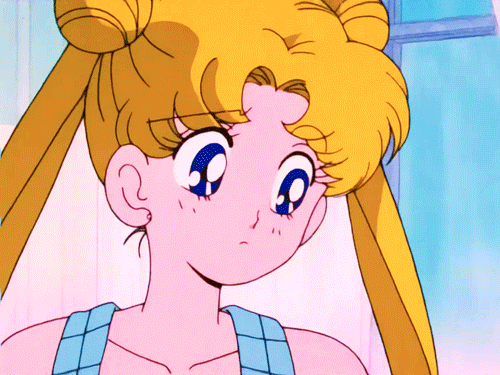
Oh, please! It ain't THAT great, you're exaggerating! I only did what any disenchanted but passionate fan would do in such scenarios!
I don't think of myself as an "angel" nor a "savior", because 90% of the characters that I rescue are more than capable to fend for themselves; what they really need is support. They need something or someone to help them to provide them clarity so they can map out their futures with little-to-no trouble.
I am a firm believer that there are no bad ideas, only bad executions. All of these series, their characters, the lore and the worlds that they live in, are absolutely brimming with gigantic amounts of potential...
...but unfortunately, it's all thrown in the trash because of incompetent writers and showrunners, who have 0% of passion and care, falling into outdated clichés and are only concerned about gaining profit. I'm even not mad, just disappointed.
As for the book thing, I really don't have the intention of expanding this story outside Tumblr, because of copyright issues and Cringe Culture bullies. Wondaria was born as a self-indulgent coping method for me to practice my writing and vent my frustrations towards mediocre and horrible series.
However, I am planning on making another MG series that doesn't depend on a pre-existing series for its survival, but still serves its purpose of a whimsical female-driven power fantasy in the future...
But anyways, many many thanks again for the compliments!
6 notes
·
View notes
Note
Hi can i request yandere savanaclaw and pomefiore when their s/o finally succumbs to stockholm syndrome? Good luck with your writing!
warnings: general yandere content, vague mentions of physical abuse, toxic relationships, drug use
leona kingscholar
cats enjoy to play with their food, but leona won’t deny it’s just nice to finally have some peace and quiet with his darling
as much fun as it was when they were so jumpy and finicky, as much as he enjoyed watching the light in their eyes die out in panic, he’d be lying if he said it didn’t get tiring after a while
leona relishes in the meek affection, months and months of being terrorized and threatened by someone as powerful as leona has taught them to be nice and obedient, and leona fully enjoys the attention
he can nap safely, knowing they won’t dare move from their spot held into his chest. before, they might have thought they could run- take advantage of his sleeping- but they know better now, don’t they?
he’s their king. he’s their everything, really. leona isn’t a very mushy guy, but when he’s holding his little herbivore in his arms... he feels a sense of future. they’re his; he’ll decide their fate, he’ll be their one and only
leona doesn’t talk a lot about it, but he’s already decided his darling will be a stay-at-home spouse. he may not have a solid idea of what his future with them looks like, but he knows for sure it’ll be pleasant for him
he’s shaped his darling into a perfect, subservient partner. he adores being pampered- love, he wants to be loved, he’s spent so long being unwanted and feared and hated he needs to be loved show him he’s wanted assure him he’s their king- and he’ll make his darling hold him as he sleeps
leona thoroughly relishes in his darling as they cling to him, forgetting their past life before being kidnapped. sure, he sometimes misses their spunk, the way they{d act before; but he much prefers the way they stick to him now, reassure him they won’t ever run, to please keep them around
ruggie bucci
ruggie has spent the entirety of the “relationship” groveling and vying for attention and affection from his darling
oh, sure, he found their defiance beautiful before. he found their fear and their tears beautiful, too. but really, ruggie just wants them to be his
yes, entirely, purely his. ruggie needs something to call his own: not the clothes he got as hand-me-downs he’ll have to hand down, not the cash he gives to his grandma and to the kids in his street- his darling is entirely his, and the fact they understand this makes him ecstatic
they’re broken? stockholm’s? oh, who cares? everything is perfect now, so does it really matter the process it took to get here?
ruggie relishes in returning from work to his darling, embracing them, nuzzling into their chest, facing no resistance.
it’s such a relief they aren’t trying to run away, really; buying locks and fixing the doors and windows isn’t cheap. they didn’t understand he was working hard for their future together, but it’s fine now, because they understand now, right? right?
seeing they’ve completely given up on running away or going home, ruggie relaxes- and by that i mean he takes on more jobs
it pains him to be away from his darling, especially when they beg for him to stay- perhaps he should’ve been more careful, breaking his previously normal and strong darling into a clingy and meek lover- but in his brain, it just makes sense. he needs to provide for his lover, right?
because in ruggie’s brain, he’s got it all planned out. he’s getting out of the slums and building the perfect life with his darling, of course- he doesn’t want them to work a day of their life, he wants their life to be picture perfect, as he works to provide a nice life. isn’t that all they need, really?
jack howl
jack is... torn
he’s been justifying his actions as “protection”- this is just his instinct to protect his mate, his instinct to protect his partner, it’s normal, he’s normal- but he knows it’s... wrong.
it terrifies him when he notices his darling stop fighting back. it terrifies him when the fear in their eyes is replaced with love, to see how they’re suddenly so dependent on him
oh, don’t get him wrong, he loves it. he relishes in the affection, in how they seek him out; they patiently sit in his room, ask to accompany him in his early morning jogs just to spend some time with him, care for his plants when he’s gone; they act almost as if they were there of his own will
and perhaps that’s why the other, rational side of him is terrified. they shouldn’t be so comfortable with him, not after all he’s done. oh, don’t get him wrong, he’d never push them away, he’d never let them go; even if they’ve stopped trying to run, he won’t leave the doors unlocked, but the mere fact they don’t even think to try is...
... he’s broken them, for sure. it has to be.
and yet he can’t bring himself to feel bad. wolves only love one person, their one and only mate. perhaps this is fate- they’re his one and only, maybe they’ve realized that. that there’s nobody else for them, that they’re meant to be with him
jack worries, still. this is fine, it is- he adores it, he relishes in it, but how far can it go...? he’ll have moments when he panics; is this love or a way his darling is coping with his actions? he’ll hold them, requesting they assure him; they love him, they really love him, right?
vil schoenheit
... by the time vil realizes his darling’s succumbed to stockholm syndrome, they’re in deep.
because vil makes a habit of slipping love potions to his darling to keep them docile and affectionate, he’ll write up their behaviour to the potions- perhaps their body has become used to them...? some sort of new reaction to the usual formula?
it’s when vil realizes the potion should’ve worn off but his darling isn’t kicking and crying or trembling that it hits him- something has changed
of course, it’s not the same. a love potion turns his darling into a malleable, meek, almost delirious doll- but his darling off the potion is usually... well, they usually fight back, scream and cry; they’re ungrateful, trying to escape vil’s care
but they... aren’t doing that, despite vil knowing the potion should have worn off hours ago
they’re quiet, looking at vil as if waiting for instructions; they play with the edge of their shirt
vil is almost overwhelmed. this is- this is all he’s wanted. this is how it should have been from day one.
he might not lay off the love potions; he doesn’t trust this “moment of clarity” as he calls it; he fears that one day his darling will return to their fear, to their shaking, trying to escape
but as time goes on, he learns that something has changed. at night, they cuddle up to him voluntarily, they let him dress them up, take care of them; and they only seem to worry about making him happy and meeting his expectations
it’s a turning point for vil. he’s been using love potions and other substances to keep his darling pliant- they have so much potential but just wouldn’t let him polish them- but now they are putty in his hands, trying so hard to meet his expectations, to earn his attention...
vil will tighten the leash. if they’re now reaching for affection and approval, he’ll play with the carrot and stick- slowly shaping them more and more into his ideal lover, rewarding their good actions with the affection and praise their isolated and broken spirit craves so much, and punishing all actions he deems “unsightly”
oh sure, his actions have already changed his darling beyond belief, but it’s not enough. vil will keep pushing, pushing and pushing- perhaps until something breaks
rook hunt
when an animal is hurt enough, it gives up; it stops running away, lies down to bleed to death or to be captured by its predator. that’s how he sees the situation; the “hunting” period is over, his darling’s given up
he can’t say it surprises him. all humans must have limits- being stalked, then kidnapped, being caught again and again, he understands how that must whittle down someone... oh, but it was all born from love, so it’s all ok, isn’t it?
indeed, this is just the next step in the relationship
his darling might not be running or jumping at shadows anymore, but rook is a lover of all love languages. he’ll gladly accept the physical affection that comes with his darling’s broken spirit
affectionate as always, rook doesn’t seem to care at all that his darling’s state is anything but natural. it’s almost something out of a romance book, the way they’ve come around, isn’t it?
because much of their time was spent fearing rook, running from him, being hurt as punishment, they’ve learnt to associate all these things with him. when they’re scared they call for him, they associate being chased with being loved, being hurt with affection. rook has perhaps used pavlovian conditioning to turn his darling into someone who couldn’t possibly survive outside of his care
a domestic animal cannot survive in the wild, rook knows this. and when he looks at his darling, who has become so used to their life locked inside, vying for their captor’s attention, sleeping so peacefully in his bed, he’s more sure than ever they belong nowhere outside of his sight
epel felmier
epel is a bit shocked, but he takes the situation with open arms
the one thing he wants the most is to be seen as strong, reliable, manly. he wants his darling to see him as everything he wants to be seen as, he wants to eliminate the image of him being “weak” or “fragile” from their mind
he often takes out his frustrations of being perceived in such ways onto them, too. he knows it’s not their fault per se, but god, it’s frustrating, and it’s not like he has many chances to let go off steam in a healthy way
on one hand, it’s a bit bittersweet. as much as he hates to say it, seeing his darling be scared of him gave him... some sort of power rush. oh, it made him feel so powerful, it really did, when he’d raise his voice and they’d flinch, when he’d grab them by the neck of the shirt when he was particularly pissed and they’d tense up. it’s wrong and fucked up- but it made him feel like he was the world’s most threatening man in his darling’s eyes
but well, having his darling settle into the “relationship” is also quite nice. he’s grown up seeing quiet, traditional marriages all through his childhood- he feels like he’s finally like those strong men who come back to their spouse each day, back to a loving partner who greets him with a smile and a kiss (and then he unlocks the chain around their ankle, and he praises them for not tugging at it, he can tell because there’s no friction burns, he’s so proud of them)
besides, just because his darling’s given up on escape, has somehow settled into a sort of fucked up routine, doesn’t mean epel is just magically fixing all the problems. he’s the problem- the way he loves, the way his heart tells him to take, take, take, to be reassured, to be in power- but they learn to try and rationalize it
it’s love, right? it- it has to be love, yes. epel is sweet. epel is nice. epel is sweet and nice and strong and he’s only doing what’s needed. epel isn’t horrible he isn’t a monster no how could they ever think that no he doesn’t hurt them he would never make them scared on purpose- it’s almost painful to watch his darling rationalize their captor’s behaviour, to relish the days epel carves apples for them and handfeeds them, to try and justify the days he ignores them and threatens them because he’s been pushed to the limit by vil
#yandere twst#yandere twisted wonderland#leona kingscholar#ruggie bucci#jack howl#vil schoenheit#rook hunt#epel felmier#Anonymous
331 notes
·
View notes
Text
Thinking about Litpollo still gives me serotonin. It’s about the connection between divinity and mortality. It’s the idea that people, individuals, have fundamental similarities with the larger forces at work in the world such that they can understand, relate to, and connect with each other. It’s about finding belonging with someone else, even when isolation and alienation are at their most extreme.
It’s about understanding and valuing time, both as something to be taken advantage of and to be at peace with, because, even for an immortal, is time truly limitless when no moment can ever be repeated? And for a mortal brought back from the dead, what should be done with time he was never meant to receive and might be taken away at any moment? It’s about differences so stark that they could seem insurmountable, bitter death and all its consequences, eternal life and all that it entails. That such differences, while they can never be truly understood, can breed empathy and love. And at the same time, such differences reassert an individuality that can’t be contained in or defined by any single relationship. The full richness of people doesn’t depend on their relationships, they don’t make people whole, and despite that, or because of it, it is significant for people to come together anyway.
It’s about seeing the depths of each other’s flaws, weakness, and loss and mutually accepting and caring for those things. It’s about trauma and recognizing it in themselves and each other and what it means to grapple with it. It’s the idea that the forces that form the nature of our world can be traumatized at all, that it’s a quality they share with humans at all, and that the feeling can be so similar that the two can aid each other through recovery. It’s about the profound impact one’s actions can have on those around them.
It’s about mortality and the lack thereof. It’s about being alive and the purpose, if any, of that. Between them are such extreme and deeply affecting experiences with death that have called into question fundamental beliefs. It’s the growth of a greater understanding of life and what makes it valuable, no matter how far it stretches out in front of someone. It’s growth born first and foremost from their own experiences, but then the potential of what they could learn from each other.
It’s about how their actions change through their experiences, treating with greater care not only the lives of others, but the significance of their own lives. It’s about the overlap between the lives of an unaging god and a short lived mortal that only met because the god was stripped of his immortality and forced to fight for the chance to survive and the mortal was brought back from death solely to be used, only to be left aimless, separated so far from the only life he was meant to live.
Back before that first death, Lityerses scoffed at the story of Icarus. He wondered how anyone could be so stupid. Mortals and gods belonged to two separate worlds and it was meant to be that way. Any mortal that got caught up in the world of the gods suffered horribly for it. Icarus was an absolute fool because nothing, he thought, was worth that fate.
Later, thousands of years later, Lityerses murmurs aloud to no one, “I owe you a humble apology, Icarus. I get it now.”
Can the sunlight love us here on earth? I don’t know, but the thought makes me happy.
#litpollo#lityerses#apollo#trials of apollo#toa#toa apollo#lester papadopoulos#pjo#sometimes its 1:30 am and im laying in bed listening to hoziers sunlight filled with rapture and grief i dont understand#and i need somewhere to put that ya know?#and so#waxing poetic#about litpollo ahfudhsakljfd#maybe its pretty silly but#it brings me some peace to imagine a relationship that embodies so many of the things i wish i could believe about the world#I cant tell if this is horrendous and fucking unbearable to read#but writing it served me a purpose so it doesnt matter#my posts
112 notes
·
View notes
Text
𝐁𝐈𝐎𝐒𝐇𝐎𝐂𝐊 𝐈𝐍𝐅𝐈𝐍𝐈𝐓𝐄 𝐒𝐄𝐍𝐓𝐄𝐍𝐂𝐄 𝐒𝐓𝐀𝐑𝐓𝐄𝐑𝐒
❛ The mind of the subject will desperately struggle to create memories where none exist ❜ ❛ One goes into an experiment knowing one could fail. But one does not undertake an experiment knowing one has failed. ❜ ❛ At least that's something we can agree on. ❜ ❛ It does seem like a dreadful place to be stranded. ❜ ❛ Heaven, friend. Or as close as we'll see till Judgment Day. ❜ ❛ I’m afraid of you. ❜ ❛ We had a deal! Open this door, right now! ❜ ❛ So you expect me to shoulder the burden? ❜ ❛ Just 'cause the city flies don't mean it ain't got its share of fools. ❜ ❛ Heads? Or tails? ❜ ❛ I told you...I'm not gonna do it! Now go away. ❜ ❛ I never find that as satisfying as I'd imagined. ❜ ❛ I guess you're expecting me... Is anyone here? Hello? ❜ ❛ Why are you following me? ❜ ❛ Violence is not the answer! Blood must not be shed. ❜ ❛ Violence is not a foregone conclusion. ❜ ❛ I see every sin that blackens your soul. ❜ ❛ Not all debts can be repaid. ❜ ❛ Chin up. There's always next time. ❜ ❛ Prophecy is my business, as blood as yours ❜ ❛ thy crook is bent and thy path is twisted. ❜ ❛ It's okay, I'm not going to hurt you. Just sit down, and everything will be fine. ❜ ❛ Is this some kind of sales pitch? Because I am not interested. ❜ ❛ I'm a friend. I've come to get you out of here. ❜ ❛ I don't dance. C'mon, let's go. ❜ ❛ This will end in blood. But then again, it always does with you, doesn't it? It always ends in blood. ❜ ❛ Oh, can you smell that? I've never smelled anything like that before, have you? ❜ ❛ Give a man a little power, he falls in all kinds of love with himself. ❜ ❛ Coming here was your idea. ❜ ❛ that fall into the water did you no favors. I'll keep an eye out for something that might ease your pain. ❜ ❛ Knock it off! Will you stop it? Will you stop it! I'm not here to hurt you. ❜ ❛ If you're going to be a sore loser, then I shan't do this again. ❜ ❛ You're a roguish type, what does it look like? ❜ ❛ Bring us the girl and wipe away the debt. ❜ ❛ Where did you learn to pick locks? ❜ ❛ Whatever that was, it's got nothing to do with the job at hand. This job's getting worse all the time. ❜ ❛ What interest does a prophet have in a bunch of carnies and carousels? ❜ ❛ I never even heard of this place before I got here. ❜ ❛ They frown on gardens in my part of town. ❜ ❛ I don't really understand what I just saw back there, but it sure as hell looks like a shortcut to getting us killed. ❜ ❛ You've always been different, haven't you? You crave no glory. ❜ ❛ You see? You're a killer, like it or not. ❜ ❛ Now that you're out of yours, you might realize cages have their advantages. ❜ ❛ I can handle whatever comes along. Trust me. ❜ ❛ A choice is better than none. No matter what the outcome. ❜ ❛ What happened back there, that...that's not the last of it, is it? ❜ ❛ Maybe you're the man I remember, maybe not. ❜ ❛ There's survival...and then there's finding pleasure in the act. ❜ ❛ Look, you seem like a decent enough sort. That said, the less you know about me, the better. ❜ ❛ I'm leaving and there's naught you can do to stop me. ❜ ❛ Me busting you out, what do you think that was? Charity? ❜ ❛ I got no quarrel with you. ❜ ❛ Are you afraid of God? ❜ ❛ I never claimed to be no hero. ❜ ❛ There's already a fight. Only question is, which side are you on?❜ ❛ Just hold up for a minute! I'm not angry with you. ❜ ❛ You killed those people. I can't believe you did that...they're all dead... You killed those people. ❜ ❛ I have no need for one such as you. ❜ ❛ Don't get too comfortable with my company. You are a means to an end, no more. ❜ ❛ You’re either a great hero or the worst of scoundrels, depending on who's doing the telling. ❜ ❛ I am a believer, but I am not a fool. ❜ ❛ What is the most admirable creature on God's green earth? ❜ ❛ Does this strike you as good news? It doesn't strike me as good news. ❜ ❛ I don't much care for you… but I must admit, you know your way around a brawl. ❜ ❛ Now, now, All I ask is that you finish what you started. ❜ ❛ Son, I do say I like the cut of your chin. ❜ ❛ You know, when your name was first passed to me, I wasn't quite sure you were the man for the job. ❜ ❛ What could people have done to deserve to be locked up in a place like this? ❜ ❛ You're a lion. But you can't blame me for looking after my own interests, can you? ❜ ❛ Lions walk with lions, not hyenas. ❜ ❛ I killed them. They were dead. ❜ ❛ You must think me some sort of...freak. I must seem ridiculous. ❜ ❛ Like all bastards, we serve it best by smothering it in its crib. ❜ ❛ Let me tell you about sin. ❜ ❛ Are you going to just sit there? ❜ ❛ the biggest sin of all, the mother of all sins, is that we sit back and take it. ❜ ❛ In this world, you were a martyr. ❜ ❛ These folk need a better class of hero. ❜ ❛ This isn't our responsibility - none of it. ❜ ❛ Why, that sort of ambition will serve you well. ❜ ❛ I had a role in this catastrophe, if you want to pretend we're innocents in this, then that's your prerogative. ❜ ❛ I saw you die. Saw it with my own eyes. ❜ ❛ I know how this feels. Listen, I think you should talk to me. ❜ ❛ How do you wash away the things that you've done? ❜ ❛ Once people get their blood up, it ain't easy to settle it down again. ❜ ❛ This prophecy business... You don't think anyone can really see the future, do you? ❜ ❛ These are dire times and I could ever so use your aid. ❜ ❛ That is an oath you cannot keep. ❜ ❛ If you were to take me back...that's death. Or something so like it, I cannot tell the difference. ❜ ❛ A mother who abandons their child doesn't draw a lot of sympathy in my book. ❜ ❛ You just got dealt a bad hand. ❜ ❛ The only difference between past and present is semantics. ❜ ❛ If we could perceive time as it truly was… what reason would grammar professors have to get out of bed? ❜ ❛ You couldn't have known this would happen. ❜ ❛ One doesn't expect a picture of one's corpse to come across so lifelessly. ❜ ❛ Listen to me. what you've been through… ain't nobody in the world deserves that. ❜ ❛ We are gettin' outta here, you got it? And you're never gonna have to look back. ❜ ❛ Child! Child! You are the lie that spewed from my womb. You are the lie, the lie, the lie. ❜ ❛ Some men dream of money, some men dream of love. My father dreamt of a flood of fire. ❜ ❛ I can see all that would be, might be and must not be. ❜ ❛ Child, would you like to pray with me? ❜ ❛ All I ever wanted is to see you live up to your potential. ❜ ❛ Humanity wrote a bad check, and the flood was the only way to settle the accounts. ❜ ❛ You'll need to eat sooner or later. If you hold out, you'll just starve to death. ❜ ❛ God put his faith in men once, too. It seems that we have something in common: disappointment. ❜ ❛ Why do you ask ‘what’ when the delicious question is ‘when?’ ❜ ❛ All I can do is watch as what I set in motion slides into its terminal stage. ❜ ❛ Time rots everything, even hope. ❜ ❛ We're going to cure you. ❜ ❛ When the body cries out, the spirit listens. ❜ ❛ Do you hear that screaming? That is the sound of your interference. ❜ ❛ Is this where you start moralizing? You forget, I know you. ❜ ❛ What are you going to do to stop me?❜ ❛ You struggle against prophecy, like a stone loosed from a sling. ❜ ❛ I don't understand. I heard you screaming, I was… I was coming to get you. ❜ ❛ Do you think...it's possible to redeem the kind of things that we've done? ❜ ❛ We're doing this together, or I'm doing it alone. Either way, I need to know the thing's been done. ❜ ❛ Rejoice! Rejoice! Death has no sting. ❜ ❛ I may be the one who strikes you down, but you've always had a knack for self-destruction. Who's to say you won't beat me to the punch? ❜ ❛ Some sins can't be forgiven.❜ ❛ I'm not going to let you kill him. ❜ ❛ I won't abandon you. ❜ ❛ You come to wipe your slate clean, but time will walk backwards before you find redemption. ❜ ❛ Everything I've done...I've done to keep you safe. ❜ ❛ You killed him. What did he mean? Huh? You tell me, what did he mean? ❜ ❛ Just drop me off if you want to. This isn't your problem. ❜ ❛ I'm a fool. I've sent mighty armies to stop you; I've rained fire on you from above. ❜ ❛ Will you do this for me, just...just this one last thing? Please… ❜ ❛ You thought the streets were paved with gold, but they were paved with blood, sweat and tears. ❜ ❛ Look at that. Thousands of doors...opening all at once. My god, they're beautiful. ❜ ❛ Baptism is the rebirth of the spirit...but sometimes the mind gets in the way. ❜ ❛ There are a million million worlds. All different and all similar. Constants and variables. ❜ ❛ We swim in different oceans but land on the same shore. ❜ ❛ Are you ready to have your past erased? Are you ready to have your sins cleansed? Are you ready to be born again? ❜ ❛ I can see all the doors, and what's behind all the doors. ❜ ❛ Hey, the deal is off, you hear me? The deal is off! ❜ ❛ You think a dunk in the river's gonna change the things that I've done? ❜ ❛ If I don't get caught, it's going to be a very long time before we see each other. ❜ ❛ Do you hate your wickedness? ❜ ❛ Are we worth saving if we will not save ourselves? ❜
91 notes
·
View notes
Text
Stolen - 14
Pairing: Loki Laufeyson &/x fem!gifted!reader Content: Gambling, mentions of heavy drinking, boredom. A/N: Survival mode: active. Clean up program “Vacation 1.0”: final scan.
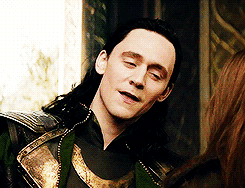
14. Snake Eyes and Sissies
... Loki ...
A nudge of a finger, a tap by the thumb, is all that’s needed to turn [Y/N]’s steps to thread an invisible route down the street. Every step she takes sends a bump into his palm. Whenever she sidesteps to avoid colliding with someone (who receives a harsh glare from Loki afterwards), it tugs at his body and he knows that he follows as much as he leads. Across a catwalk and into a lower section of Knowhere until they reach the destination in the shape of a secluded workshop with the owner’s name as the only identifier. Finally, Loki dares let go and he’s pleased to see she keeps close even as he pushes the door open and they’re met with stale air carrying the scents of hot metal and smoke.
“No credits. Only trades.” The creaky voice calls out sharply from behind a heap of scrap on a table in order to be heard over the grind of sawing through metal.
Loki smirks. “Think you can match a Stealth Hawk, Ek’ir?”
The screeching of the tool stops abruptly and a few of the pieces in the pile shifts due to movement behind. “What’s condition?”
“It’s seen some years...got a few dings, too.” Despite the reputation of the Skrull’s fleet, he knows this will be a hard sell. “Nearly intact and with full manoeuvrability.”
A small figure appears at the top of the scrap heap, round eyes invisible behind the goggles and the skin colour indistinguishable due to layers of oil and dirt. Still, Loki knows how carefully the craftsman is at sizing anything (and anyone) up.
“Define...nearly.” Hopping down from the table, they pads towards the potential customers.
“Got no blasters,” the Asgardian reluctantly admits.
Nearly through the first round, Ek’ir stops circling [Y/N] to stare at the Jotun with open mouth. “Why the Flerken would you dismantle the blasters?!”
“It was that or lose the entire ship.”
Meanwhile, the human is trying to come to terms with the situation. Born on a primitive world, her wonder at space travel and the visit on Alfheim had been reasonable, however she is bordering on rude if she doesn’t stop staring at the short person.
“If, and I mean if, it’s in good shape...” The cogs are turning behind the goggles to evaluate the potential gains and losses. “I’ll have to inspect it.”
“Of course.”
“Got a good few counteroffers you can choose from, at the moment.”
Loki arches a brow. “Freedom of choice?”
“We’ll see...but the Reach stays off limit!”
Few things would be as satisfying as wiping the smirk off Ek’ir’s proud little face. A Reach. Maybe the shop owner doesn’t know who Loki really is, but the species has a natural affinity for knowing exactly what a customer wants the most making it rare for one of their kind to settle in this kind of trade.
“Fair enough,” the god shrugs, “would’ve been nice to break open my casket of Asgardian mead onboard an Asgardian ship, though.”
It’s silent enough to hear the rowdy main street several blocks away as the trader pushes the goggles up onto the forehead, revealing exquisite lashes bordering yellow, cat-like eyes with deceptively narrow pupils. Small feet carries their owner right in front of Loki as if Ek’ir could stare down the much taller god.
“You got mead?” Loki shrugs once more. “How...how’ve you gotten Asgardian booze?”
Wouldn’t you like to know? “How have you gotten a Reach?”
... Reader ...
You’ve given up figuring out what Loki and the little person is talking about, preferring instead the distraction of the mess surrounding you. It’s a crammed place, heaps of scrap metal and tools tucked under an inconveniently low ceiling – although the owner wouldn’t have an issue with it, you suppose. Trying not to stare at the short person, you begin a game of guessing which parts could go where on a spaceship. The mental images quickly become grotesquely cartoonish, resembling the work of imaginative kids rather than actual space ship engineers.
Lost to your own musings, the gentle touch of Loki’s hand brings you back with a start.
“Come,” is all he says.
The delighted glint in his eyes doesn’t bode well as you follow both him and the alien out and back the way you came, mostly. A slight detour is allowed to bring you along to another dock with several vessels of different size and type one of which is the focus of attention. The Asgardian is playing it cool but you can see by the slant of his smile that he’s delighted with one of the ships in particular, commenting on its current state versus the original specs which are far beyond your grasp.
However, he doesn’t seem to strike a deal before having led the little one back to the ship that was your prison. It is the first time you really get to look at it without being in a rush (the second time seeing it from the outside at all). Sleek and silvery with a shape reminding you of a jagged spearhead it looks as lethal as you originally felt.
A Bugatti of space? Honestly, neither interstellar nor earthly transportation has mattered much to you as long as it worked and got you from point A to point B – you didn’t even own a car because that’s just silly when living in the city – but you’re pleased with the analogy.
“You got a deal if you throw in the cask of mead too,” the alien creaks.
"You drive a hard bargain," your travel partner retorts dryly.
Back and forth they go, inspecting ships and trying to outdo the other in tall tales about the vessels' past travels while you're bored out of your mind, eventually plopping onto the soft seat in a cabin of what they call “the Reach”. From there, you can see past the broken metal that could have made out the temporal bone (when the place wasn’t a wannabe planet) and to the stars beyond. How far are we from Earth?
This is only the second place you've been to since life changed drastically. In a way, it makes you feel special. Privileged. Deep within you a primal urge to keep moving is stirring, it's vibrating through every cell of the body until they ache with a need you can't satisfy on your own. Glancing briefly at Loki, you prefer to think it's also that longing, roaring silently and sending the butterflies in your belly swarming over a fire pit below.
"The rules are clear?" the little alien, Ek'ir, asks.
The Asgardian nods. "Doubles top with sixes as the best. Everything else reads as they show."
Propping yourself up on an elbow, you see them on either side of the table with a dice cup in between (where ever they've gotten that from). A wooden cask balances at the far end – a trophy on display. Memories from the parties you've gone to come back followed by vague rules from drinking games which always became less important as the nights carried on.
Ek'ir begins, slamming the cup down after having thoroughly rattled the dice around. A short peek. A frown.
"42."
Loki's face doesn't betray whatever he might be thinking. Slender fingers simply grab the cup and scoops up the roll to mimic the shop owner's motions. "Snake eyes."
The small hand with suction cups hovers in the air as the owner thinks carefully. With a flick of the finger the claim is proven true, resulting in a woody groan from this round's loser who of course is intend on revenge – a drawn out duel marked by small increments in the rolls before the Asgardian finds himself bested when trying to bluff. He takes it neatly, even sends you a wink.
"32," Ek'ir opens the third and final session.
"54."
The dice rattle a bit longer than strictly necessary. "65."
"Snake eyes," the god offers politely on return, causing the adversary to freeze.
Even you hold a breath. You have no clue why it's so important to get a different spaceship (and particularly this one except that it's aesthetically pleasing), however some sneaky plan must be depending on it or Loki wouldn't have gone through the trouble of bartering with the little alien.
"Naaaah..." They don't sound convinced. "A second one that soon? You think I'm gullible?" Still, the cup remains untouched, looming on the table.
"If you think me a liar, simply call my bluff." There's an air of nonchalance to the taller of the players. "Otherwise...best it."
"Probably counting on it, aren't you?"
There's no reply other than a shrug and a non-committal arching of the brows. He's bluffing. Admittedly, you're not sure. Yay for not playing him. Surely, Asgardian mead can't be that amazing?
"Ha!" Wrinkly hands snatch the cup away, a bright gleam in the alien eyes and a smile to match. Only...the glee dissipates as the roll is revealed: two ones.
#Loki#loki fanfic#Loki mcu#loki x reader#Loki x you#Loki Laufeyson#Loki Laufeyson x reader#Loki Laufeyson x you#mcu#mcu Fanfiction#Mcu Fanfic#Loki fanfiction#slow burn#Loki slow burn#from enemies to lovers#enemies to lovers#Loki enemies to lovers#Loki from enemies to lovers#fem!reader#reader#Reader insert#Gifted!reader#Loki series#post-Battle of New York#Alternate timeline#Timeline spawned in Endgame#idiots in love#Loki feels#fanfiction#fanfic
66 notes
·
View notes
Text
So what’s really up with those demon and angel characters?
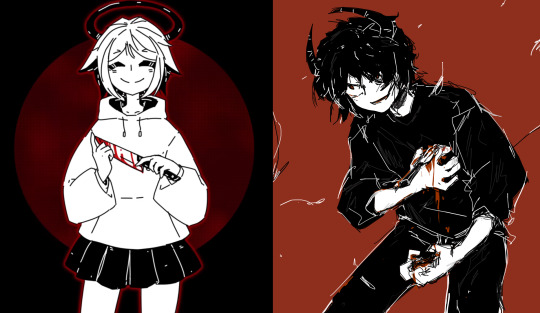
I’m gonna say right off the bat - this isn’t an explanation of the song series I used these two for. In fact, the songs featuring these characters on their covers have surprisingly little to do with one another! I just liked the simple designs and drew them whenever it felt appropriate. I tried thinking of an actual story to tie them all together around the time I made The Heartwarming Story Of My Creation, but it was so messy and full of edge that I promptly scrapped it lol
HOWEVER!
These characters DO come from a short novel/comic idea I had way before starting vocaloid. It was a rather silly concept for a slice-of-life story, which could potentially evolve into something with an actual plot!
~So here it is~
It all takes place in a world where having a demonic servant is treated as the norm. In fact, not having a personal demon is considered weirder than having one! There are ads for various contracting agencies, different demon ratings, demons who specialize in different services etc., etc. It’s not uncommon for parents to bind their child’s soul to a demon as soon as the baby is born, though it’s often done a bit later in life (however, if you’re under 18, you can make a contract only with special permission from your guardian).
Since everyone and their mother has a being with reality-bending powers at their side, the servants have very strict limitations on what they can and can’t do. At base level the overwhelming majority of them boil down to being an extremely efficient houseworker - they are restricted to doing stuff like chores, buying things, helping with communication, keeping company, changing their own appearance to suit the customer’s tastes (a lot of people stick with the demon’s default monochrome-human-with-horns-and-tail form, though, since that’s what they’ve grown used to) changing the clients appearance (usually not to an unrecognizable degree), being a bodyguard, etc.
There are ways of lifting some of those limitations by binding more than one soul to a single demon (but the servant will continue to fully obey only one person). So the most powerful demons tend to be familial - those who have been passed on from parents to their children over the course of generations. The most influential people in the world have extremely strong familial demons.
Truly powerful familial demons are rare, because:
the parent may not have tied the child’s soul to the familial demon before dying
by the time most parents die, their children have already gotten a servant of their own
the child doesn’t want to accept the familial demon for personal reasons
Some people are hesitant or straight-up opposed to the idea of getting a servant, since, while demons never disclose any details about the process of soul consumption or, for that matter, anything about the afterlife, it’s widely understood to be hellish. The thing is, it’s unclear whether “happy” afterlife even exists - unlike demons, heavenly beings like god or angels or even ghosts do not manifest in the physical world. Some believe that there is no paradise at all, and the only two options for the soul after the body dies are being consumed by a demon and continuing its existence in that particular demon’s “hell” or simply disappearing. The lack of information about what really happens after death makes many people brush off the consequences of making a contract in favour of living a much more safe and comfortable life.
SO
Like I said in the beginning, the comic was supposed to be a series of slice-of-life episodes involving a group of demon friends and their clients (with Kafka being the focus). I didn’t develop them that much, so their characters were pretty simple!
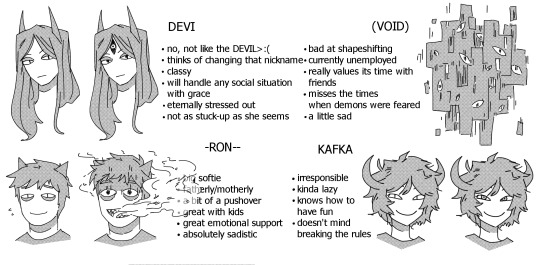
Since demons’ actual names are near impossible for humans to pronounce, they tend to settle for nicknames. They are primarily genderless, but usually present themselves as either male or female for convenience sake; they can change gender according to their client’s wishes. Like humans, every demon is an individual and, while their baseline powers are the same, depending on their heritage, talent and the way they use the souls they consume, their higher-tier abilities and battle styles may differ wildly. Generally it is considered rude to ask a demon what their higher abilities are - even good friends may not know the real extent of each other’s power.
Making contracts with humans and serving their clients for an entire lifetime to them is basically like a regular customer service-type job. Their moral beliefs are a bit different than those of humans, so, while humans can grow very attached to their servants, the demons themselves feel little to no remorse about consuming their clients’ souls. In a way it’s similar to how people treat farm animals. The animal can be cute and you may appreciate the times spent with it, but in the end you’re not going to be too torn up about eating it.
While demons live for a long time and technically do not require human souls to survive, consuming a human soul is the highest form of pleasure for them - not only does it boost and replenish their power, but also gives immense spiritual fulfillment. A demon living purely off of animal souls will always be much, much weaker than a demon who has eaten a single human soul over the course of the last 100 or so years.
Oh, but what about the angel girl?
Angels don’t manifest in the real world, right?
Right?
R I G H T ?

Right.
Levi was another important character (woah, shocking), second only to Kafka. They were a familial demon, who had been growing displeased with the way their client - the most recent heir - had been conducting his life. Kafka had a strange, vaguely hostile, but close relationship with Levi.
I had a few ideas about what I want do with the story, but it’s definitely not something I can fully dedicate myself to currently. Still, I think it’s a fun, kinda nonsensical concept that I’d like to use in the future. Or not!
At least now that I’ve thrown it out there

#the sheer size of this post#an absolute unit#i know i promised it a few days ago but come on#myart#scraps#idk how to tag this#demonverse#blog#obligatory homestuck joke#Kafka#Ron#Levi#levi your angle form#Levi yuor debil form#devi#void#beginner's guide to heresy#bgh
426 notes
·
View notes
Text
ISLAM 101: Muslim Culture and Character: Embracing The World:
EDUCATION FROM CRADLE TO GRAVE
Introduction
The main duty and purpose of human life is to seek understanding. The effort of doing so, known as education, is a perfecting process though which we earn, in the spiritual, intellectual, and physical dimensions of their beings, the rank appointed for us as the perfect pattern of creation. At birth, the outset of the earthly phase of our journey from the world of spirits to eternity, we are wholly impotent and needy. By contrast, most animals come into the world as if matured or perfected beforehand. Within a few hours or days or months, they learn everything necessary for their survival, as well as how to relate to their environment and with other creatures. For example, sparrows or bees acquire maturity and all the physical and social skills they need within about twenty days; we need twenty years or more to acquire a comparable level of maturity.
We are born helpless as well as ignorant of the laws of life and must cry out to get the help we need. After a year or so, we can stand on our feet and walk a little. When we are about fifteen, we are expected to have understood the difference between good and evil, the beneficial and the harmful. However, it will take us our whole lives to acquire intellectual and spiritual perfection. Our principal duty in life is to acquire perfection and purity in our thinking, conceptions, and belief. By fulfilling our duty of servanthood to the Creator, Nourisher, and Protector, and by penetrating the mystery of creation through our potentials and faculties, we seek to attain to the rank of true humanity and become worthy of a blissful, eternal life in another, exalted world.
Our humanity is directly proportional to our emotions’ purity. Although those who are full of bad feelings and whose souls are influenced by egoism look like human beings, whether they really are human is doubtful. Almost everyone can train their bodies, but few can educate their minds and feelings. The former training produces strong bodies, while the latter produces spiritual people.
Our Innate Faculties and Education
Since the time of Ibn Miskawayh, human faculties or “drives” have been dealt with in three categories: reason, anger, and lust. Reason encompasses all of our powers of conception, imagination, calculation, memory, learning, and so on. Anger covers our power of self-defense, which Islamic jurisprudence defines as that needed to defend our faith and religion, sanity, possessions, life and family, and other sacred values. Lust is the name for the driving force of our animal appetites:Decked out for humanity is the passionate love of desires for the opposite sex and offspring; for hoarded treasures of gold and silver; for branded horses, cattle, and plantations; and for all kinds of worldly things (3:14).
These drives are found in other creatures. However, whether in their desires, intelligence, or determination to defend life and territory, these drives are limited in all creatures but humanity. Each of us is uniquely endowed with free will and the consequent obligation to discipline our powers. This struggle for discipline determines our humanity. In combination with each other and with circumstances, our faculties often are expressed through jealousy, hatred, enmity, hypocrisy, and show. They also need to be disciplined.
We are not only composed of body and mind. Each of us has a spirit that needs satisfaction. Without this, we cannot find true happiness and perfection. Spiritual satisfaction is possible only through knowledge of God and belief in Him. Confined within the physical world, our own particular carnal self, time, and place can be experienced as a dungeon. We can escape it through belief and regular worship, and by refraining from extremes while using our faculties or powers. We must not seek to annul our drives, but to use our free will to contain and purify them, to channel and direct them toward virtue. For example, we are not expected to eliminate lust, but to satisfy it lawfully through reproduction. Happiness lies in confining our lust to the lawful bounds of decency and chastity, not in engaging in debauchery and dissipation.
Similarly, jealousy can be channeled into emulation free of rancor, which inspires us to emulate those who excel in goodness and good deeds. Applying the proper discipline to our reason results in the acquisition of knowledge, and ultimately of understanding or wisdom. Purifying and training anger leads to courage and forbearance. Disciplining our passion and desire develops our chastity.
If every virtue is thought of as the center of a circle, and any movement away from the center as a vice, the vice becomes greater as we move further away from the center. Every virtue therefore has innumerable vices, since there is only one center in a circle but an infinite number of points around it. It is irrelevant in which direction the deviation occurs, for deviation from the center, in whatever direction, is a vice.
There are two extremes related to each moral virtue: deficiency or excess. The two extremes connected with wisdom are stupidity and cunning. For courage they are cowardice and rashness, and for chastity they are lethargy and uncontrolled lust. So a person’s perfection, the ultimate purpose of our existence, lies in maintaining a condition of balance and moderation between the two extremes relating to every virtue. ‘Ali ibn Abi Talib is reported to have said:
“God has characterized angels by intellect without sexual desire, passion, and anger, and animals with anger and desire without intellect. He exalted humanity by bestowing upon them all of these qualities. Accordingly, if a person’s intellect dominates his or her desire and ferocity, he or she rises to a station above that of angels, because this station is attained by a human being in spite of the existence of obstacles that do not vex angels.
“Improving a community is possible only by elevating the young generations to the rank of humanity, not by obliterating the bad ones. Unless a seed composed of religion, tradition, and historical consciousness is germinated throughout the country, new evil elements will appear and grow in the place of each eradicated bad one.”
The Real Meaning and Value of Education
Education through learning and a commendable way of life is a sublime duty that manifests the Divine Name Rabb (Upbringer and Sustainer). By fulfilling it, we attain the rank of true humanity and become a beneficial element of society.
Education is vital for both societies and individuals. First, our humanity is directly proportional to our emotions’ purity. Although those who are full of bad feelings and whose souls are influenced by egoism look like human beings, whether they really are so is questionable. Almost anyone can be successful in physical training, but few can educate their minds and feelings. Second, improving a community is possible by elevating the coming generations to the rank of humanity, not by obliterating the bad ones. Unless the seeds of religion, traditional values, and historical consciousness germinate throughout the country, new bad elements will inevitably grow up in the place of every bad element that has been eradicated.
A nation’s future depends on its youth. Any people who want to secure their future should apply as much energy to raising their children as they devote to other issues. A nation that fails its youth, that abandons them to foreign cultural influences, jeopardizes their identity and is subject to cultural and political weakness.
The reasons for the vices observed in today’s generation, as well as the incompetence of some administrators and other nation-wide troubles, lie in the prevailing conditions and ruling elite of 25 years ago. Likewise, those who are charged with educating today’s young people will be responsible for the vices and virtues that will appear in another 25 years. Those who wish to predict a nation’s future can do so correctly by taking a full account of the education and upbringing given to its young people. “Real” life is possible only through knowledge. Thus, those who neglect learning and teaching should be counted as “dead” even though they are living, for we were created to learn and communicate to others what we have learned.
Right decisions depend on having a sound mind and being capable of sound thought. Science and knowledge illuminate and develop the mind. For this reason, a mind deprived of science and knowledge cannot reach right decisions, is always exposed to deception, and is subject to being misled.
We are only truly human if we learn, teach, and inspire others. It is difficult to regard those who are ignorant and without desire to learn as truly human. It is also questionable whether learned people who do not renew and reform themselves in order to set an example for others are truly human. Status and merit acquired through knowledge and science are higher and more lasting than those obtained through other means.
Given the great importance of learning and teaching, we must determine what is to be learned and taught, and when and how to do so. Although knowledge is a value in itself, the purpose of learning is to make knowledge a guide in life and illuminate the road to human betterment. Thus, any knowledge not appropriated for the self is a burden to the learner, and a science that does not direct one toward sublime goals is a deception.
But knowledge acquired for a right purpose is an inexhaustible source of blessings for the learner. Those who possess such a source are always sought by people, like a source of fresh water, and lead people to the good. Knowledge limited to empty theories and unabsorbed pieces of learning, which arouses suspicions in minds and darkens hearts, is a “heap of garbage” around which desperate and confused souls flounder. Therefore, science and knowledge should seek to uncover humanity’s nature and creation’s mysteries. Any knowledge, even “scientific,” is true only if it sheds light on the mysteries of human nature and the dark areas of existence.
Family, School, and Environment
People who want to guarantee their future cannot be indifferent how their children are being educated. The family, school, environment, and mass media should cooperate to ensure the desired result. Opposing tendencies among these vital institutions will subject young people to contradictory influences that will distract them and dissipate their energy. In particular, the mass media should contribute to young people’s education by following the education policy approved by the community. The school must be as perfect as possible with respect to curriculum, its teachers’ scientific and moral standards of teachers, and its physical conditions. A family must provide the necessary warmth and quality of atmosphere in which the children are raised.
In the early centuries of Islam, minds, hearts, and souls strove to understand that which the Lord of the heavens and the Earth approves. Each conversation, discussion, correspondence, and event was directed to that end. As a result, whoever could do so imbibed the right values and spirit from the surrounding environment. It was as if everything was a teacher to prepare the individual’s mind and soul and develop his or her capacity to attain a high level in Islamic sciences. The first school in which we receive the necessary education to be perfected is the home.
The home is vital to raising of a healthy generation and ensuring a healthy social system or structure. This responsibility continues throughout life. The impressions we receive from our family cannot be deleted later in life. Furthermore, the family’s control over the child at home, with respect to other siblings and toys, continues at school, with respect to the child’s friends, books, and places visited. Parents must feed their children’s minds with knowledge and science before their minds become engaged in useless things, for souls without truth and knowledge are fields in which evil thoughts are cultivated and grown.
Children can receive a good education at home only if there is a healthy family life. Thus marriage should be undertaken to form a healthy family life and so contribute to the permanence of one’s nation in particular, and of the human population in general. Peace, happiness, and security at home is the mutual accord between the spouses in thought, morals, and belief. Couples who decide to marry should know each other very well and consider purity of feelings, chastity, morality, and virtue rather than wealth and physical charm. Children’s mischief and impudence reflect the atmosphere in which they are being raised. A dysfunctional family life increasingly reflects upon the child’s spirit, and therefore upon society.
In the family, elders should treat those younger than them with compassion, and the young should show respect for their elders. Parents should love and respect each other, and treat their children with compassion and due consideration of their feelings. They must treat each child justly and not discriminate among them. If parents encourage their children to develop their abilities and be useful to themselves and the community, they have given the nation a strong new pillar. If they do not cultivate the proper feelings in their children, they release scorpions into the community.
The School and the Teacher
A school may be considered a laboratory that offers an elixir that can prevent or heal the ills of life. Those who have the knowledge and wisdom to prepare and administer it are the teachers.
A school is a place of learning about everything related to this life and the next. It can shed light on vital ideas and events, and enable its students to understand their natural and human environment. It also can quickly open the way to unveiling the meaning of things and events, thereby leading a student to wholeness of thought and contemplation. In essence, a school is a kind of place of worship whose “holy people” are teachers.
Real teachers sow the pure seed and preserve it. They occupy themselves with what is good and wholesome, and lead and guide the children in life and whatever events they encounter. For a school to be a true institution of education, students first should be equipped with an ideal, a love of their language and how to use it most effectively, good morals, and perennial human values. Their social identity must be built on these foundations.
Education is different from teaching. Most people can teach, but only a very few can educate. Communities composed of individuals devoid of a sublime ideal, good manners, and human values are like rude individuals who have no loyalty in friendship or consistency in enmity. Those who trust such people are always disappointed, and those who depend upon them are sooner or later left without support. The best way of equipping one with such values is a sound religious education.
A community’s survival depends on idealism and good morals, as well as on reaching the necessary level in scientific and technological progress. For this reason, trades and crafts should be taught beginning at least in the elementary level. A good school is not a building where only theoretical information is given, but an institution or a laboratory where students are prepared for life.
Patience is of great importance in education. Educating people is the most sacred, but also the most difficult, task in life. In addition to setting a good personal example, teachers should be patient enough to obtain the desired result. They should know their students very well, and address their intellects and their hearts, spirits, and feelings. The best way to educate people is to show a special concern for every individual, not forgetting that each individual is a different “world.”
School provides its pupils with the possibilities of continuous reading, and speaks even when it is silent. Because of this, although it seems to occupy only one phase of life, school actually dominates all times and events. For the rest of their lives, pupils re-enact what they learned at school and derive continuous influence therefrom. Teachers should know how to find a way to the student’s heart and leave indelible imprints upon his or her mind. They should test the information to be passed on to students by refining their own minds and the prisms of their hearts. A good lesson is one that does more than provide pupils with useful information or skills; it should elevate them into the presence of the unknown. This enables the students to acquire a penetrating vision into the reality of things, and to see each event as a sign of the unseen world.
#allah#god#islam#muslim#quran#revert#convert#convert islam#revert islam#reverthelp#revert help#revert help team#help#islamhelp#converthelp#prayer#salah#muslimah#reminder#pray#dua#hijab#religion#mohammad#new muslim#new revert#new convert#how to convert to islam#convert to islam#welcome to islam
3 notes
·
View notes
Text
Little Red Headcanons: Ruby the Saviour of Humanity
crystalandbrass asked
“Hey long time no speak so I have two theories on RWBY I want to run by you the first is the lamp, I feel it functions like the old 'Be careful how you word your wish' essentially you have to be spercific with what you ask as Ozpin only asked 'How do I kill Salem?' Djinn obviously said there was no way because Salem is immortal, however if Ozpin asked 'How do I defeat Salem?' Djinn might have given up how to undo Salem's immorttality. What do you think? I will give the 2nd one later”
-----------------------------------------------------------------------------------------------------------
Squiggles Answers:
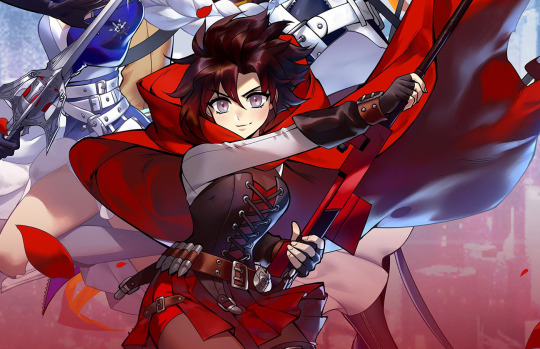
@crystalandbrass
Hey Crystal, what’s up? Apologies for the late response but I hope you’ve been doing well in these trying times, fam. To answer your question, that’s an interesting way to look at it. I agree with your point about Jinn answering questions according to their wording but I’d like to add an additional hunch that I think the results are also dependent on the person asking the questions.
During his lifetime with Norman, Ozma asked Jinn how “he” could destroy Salem. Only for Jinn to answer that “he” couldn’t. For me, I took that as Jinn indicating that Ozma wasn’t the one destined to stop Salem once and for all. It doesn’t necessarily mean that destroying Salem isn’t possible. Ozma (and by extension, the Wizards of Light following in his lineage) just wasn’t the one meant to do so. He had his own part to play in this ongoing fight for the fate of humanity.
I’d like to stand by the concept that there is someone in Remnant who destined to stop Salem.
I also believe that the key to stopping Salem for good isn’t through destroying her either. Yes she needs to be stopped, but I don’t think her fate is to die by the hands of her chosen adversary but rather the way the Gods intended for her to die.
It’s for this reason I like the theory that was eluded by Nora in V7CH6 during her conversation with Ruby.
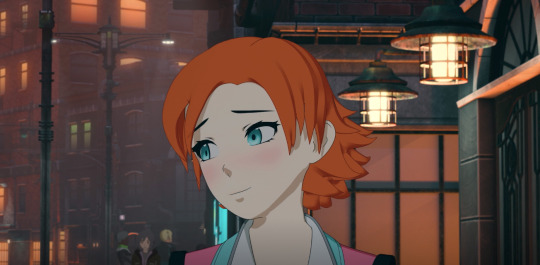
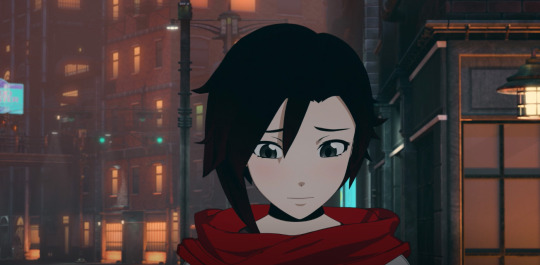
“…We’ve spent so much time worrying about how Ironwood would react to the truth about her; but has any of us considered how we’re even going to beat her if we managed to work past that?”
“Jinn said she can’t be beaten.”
“She told Oz that he couldn’t destroy her.”
“…But…maybe someone else could?”
“…I don’t know.”
A part of me thinks that if someone were to ask Jinn the question of “Who can stop Salem?” then I believe her answer might be a bit more hopeful as she reveals the identity of humanity’s true saviour against the plight of Salem. In the Lost Fable, Jinn did say that in time Salem would’ve ultimately met her adversary. During the events of that episode, us as viewers were led to believe that that person would be Ozma.
However now that I think about it---despite creating Salem and resurrecting the soul of her former beloved, the Brother Gods NEVER really tasked Ozma with stopping Salem. All the God of Light told Ozma to focus on was figuring out a way to unite humanity as a means of recreating the world that they once had---that he once knew. A world where humanity was made whole again with the return of the Gods and their magic to live among the People of Remnant again. Now that I think about it, the God of Light warned Ozma to not pursue Salem as he more desired for him to focus on avoiding the inevitable Judgement Day and the end of the world should he fail in bringing the people together.
From the start, the purpose of Ozma and the Wizards of Light was always to see to humanity’s preservation by uniting them for it is only in harmony shall they be saved and spared the wrath of the Gods should they be summoned back to Second Remnant.
From what I gathered from the Lost Fable, First Remnant was a time when mankind more or less lived in commune with not just each other but also the Brothers. However that changed after Salem rallied all the leaders of the First People of Remnant and turned them against the Gods thus leading to their mass genocide by the God of Darkness.
You can say that from the beginning, Salem has been a figure of conflict--- dividing humanity--- turning them against one another as a means of only fulfilling her own selfish desires.
From the get-go, Salem has been a source of manipulation and division. This was not only evidenced by her turning the People of Remnant against the Gods but her first attempt was done even before that when she dared turn the Brothers against one another after manipulating Darkness into resurrecting Ozma against his brother’s wishes and prior knowledge.
Salem was only cursed because she refused to see the value in human life beyond herself and sadly to say, even after living on Remnant for over thousands of years; she still only views mankind as nothing less to her than mere pawns to achieve her goals. She even came to see her own beloved Ozma as the very same thing---an obstacle against her retaining her sense of freedom.
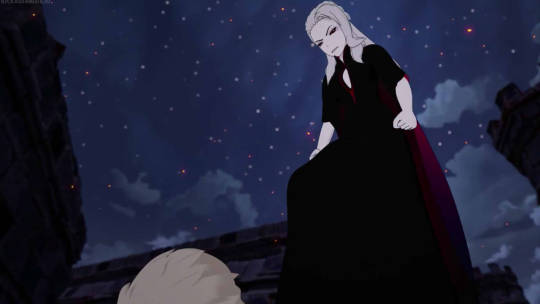
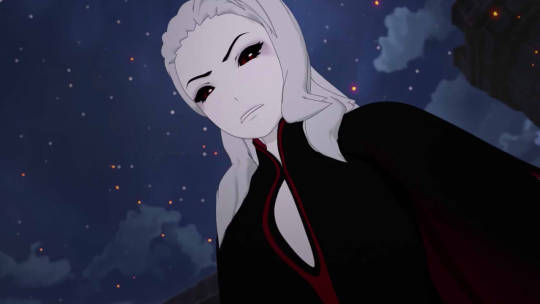
“…We finally have freedom!”
I know other RWBY fans have pegged Salem to be nothing more than an irredeemable villain and character; however I think the opposite. Ultimately, I think Salem’s fate is to die after finally learning the lesson the God of Light tried to get her to see. Believe it or not, I’m actually an advocate for Salem getting redeemed at some point for the future of RWBY.
While Salem has been shown to be selfish and manipulative, she’s also expressed a softer, more compassionate side to her as well; as evidenced by her love and determination for Ozma and even their children during Ozma’s second lifetime as Diggs.
I’d even go as far as to say that there is a slight, almost parental approach to Salem’s mentor and apprentice relationship with Cinder Fall; if that makes sense. Again, while I understand that Salem is a villain, there are qualities about her that has convinced me that she can be redeemed and ultimately will be saved since that’s how I think her story will end based on elements from the Lost Fable.
I think Salem is the way she is, not so much due to her corruption from her baptism in the Grimm Pools of Darkness but more so as a result of her past and upbringing; being locked away in isolation for so long---having her own freedom stripped away away from her at an adolescent age by the acts of her cruel father.
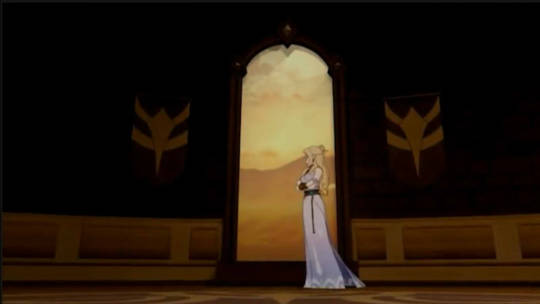
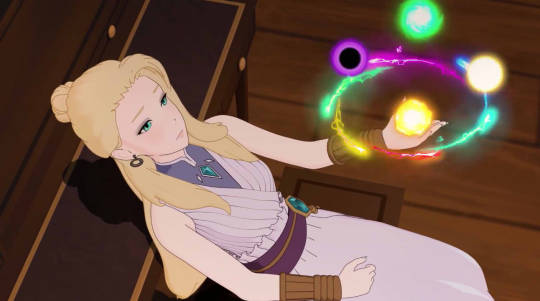
Going back to your question on the lamp---I think what needs to happen next is either for someone to ask Jinn for the identity of the person destined to bring forth Salem’s end. Or for that person to ask Jinn that question herself.
Since V6, I can’t help but feel like the show is slowly starting to pave the reveal that Ruby Rose will be the one to stop Salem. NOT destroy her or kill her. But more or less guide her back to the light after the former lonely princess had submerged herself in darkness for so long; thus transforming herself into the wicked witch we knew her to be.
I feel like Ruby has the potential of being placed in a similar tricky scenario that Aang from Avatar: The Last Airbender faced during his final confrontation with Fire Lord Ozai.
Much like Aang, this squiggle meister believes that Ruby will be the one to stop Salem but she’ll be torn over the thought of actually killing her if she were to discover to possess that kind of power.
I’m not saying I’m expecting Ruby to talk Salem out of being evil.
I’m more in favour of my Little Red Ruby headcanon of Ruby’s silver eyes being a remnant of the God of Light’s Fountain of Light and Creation that was introduced during the events of the Lost Fable. We’ve already met Ozma---the First Wizard of Light tasked by the God of Light and blessed with his power to unite the people of Remnant to avoid its destruction should Judgement Day come.
Now what I need to know is the origins of the Silver Eyes. I want to know who the First Silver Eyed Warrior to walk Remnant was since I believe that their beginning is connected to the Fountain of Life and Creation. Much like the Grimm Pools, the Fountain of Life and Creation once belonged to a God and thus harbours some semblance of his power.
This is how I think Salem is able to command the Creatures of Grimm. It was the God of Darkness who first made the Grimm, correct? Therefore since his pool was connected to him, by baptising herself in said pool that once belonged to a God, Salem gained powers akin to the God of Darkness---at least in respect to the ability to command the Grimm and even create her own Grimm monstrosities.
While the God of Darkness’ Grimm Pools survived the test of time, the Fountain of Life and Creation seemed to have been destroyed during the meteor shower sparked by the God of Darkness destroying part of the moon. Since World of Remnant described man being born from dust; my assumption is that the Silver Eyed Warriors are the remnants of the Fountain.

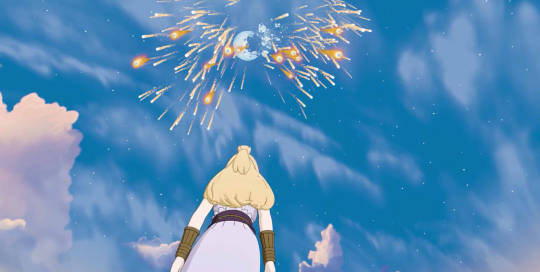
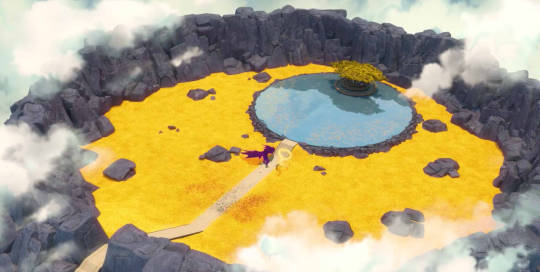
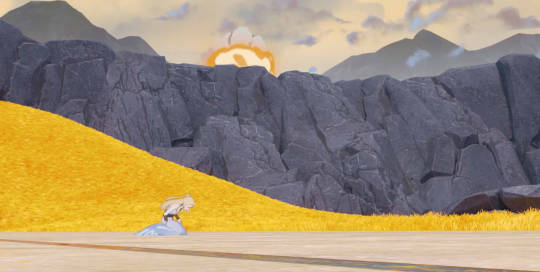
Therefore, the Silver Eyed Warriors are the living embodiment of the Fountain of Life and Creation. This, by my understanding, is how the Silver Eyed Warriors are connected to the God of Light. Just like the Wizards of Light in Ozma’s lineage, the Silver Eyes possess a portion of Light’s power running through their veins.
In the Lost Fable, it was shown that the God of Light cursed Salem with immortality by dropping her into his Fountain. If the Silver Eyes were ‘born’ from the Fountain then a Silver Eyed Warrior may be the only being that can actually harm Salem or even stop her.
Hence Ruby’s importance as she is currently the last living Silver Eye, according to the main series narrative. I remember reading somewhere about a theory someone had shared about the markings on Salem’s body---the weird blood-coloured scars that resemble veins---someone made theory that those markings may have come from Silver Eyed Warriors that Salem killed in the past.

I actually quite like this theory and I’d like to add my own spin on it.
In V4, Arthur Watts alluded to Salem and her minions dealing with Silver Eyes in the past and this point was confirmed in later iterations such as V6CH7 with Tock and her pawns targeting a young Maria Calavera in her prime and even the Warrior from the Warrior in the Woods tale in the upcoming Fairy Tales From Remnant.
So it’s my understanding that Salem and her pawns have been ruthlessly hunting and killing the Silver Eyes for many generations due to their unique ability to stop the Grimm.
But here’s what I think. What if…Salem’s scars were as a result on an encounter with ONE Silver Eyed Warrior and not as a result of her dealing with many over the years?
Despite hunting their kind for so long, what if…there has only been one Silver Eyed Warrior who has come close to even touching Salem and those scars are the lasting impression that that particular Silver Eye left on Salem as a relic of what that power can actually do to her.
What if… Salem got her scars from Summer Rose?

Even though Salem succeeded in killing Summer (as alluded to in V7CH10), what if…another Summer Rose secret is the revelation of the way to stop Salem---a feat that Summer left in the hands of her daughter.
I know this is only a hunch but I really do like the thought of Summer Rose being the one who inflicted those types of wounds on Salem, revealing the witch’s own fallibility in a sense. It’s not a bad concept but for now it’s just another one for the table of possibilities.
Another Salem-inspired RWBY headcanon of mine is that the Silver Eye power will actually purify Salem of the effects of the Grimm Pools, thus severing her connection to the Grimm. What I find unique about Salem is that she is a being who has been touched by both light and darkness. Light made her immortal while Darkness gave her reign over the Creatures of Grimm.
If my hunch about the silver eyes being a remnant of the Fountain of Life and Creation is correct then Salem being hit with the power of a Silver Eyed Warrior on full blast; as displayed by Ruby Rose during the Fall of Beacon, might be what finally ‘kills’ the Wicked Witch of the West.
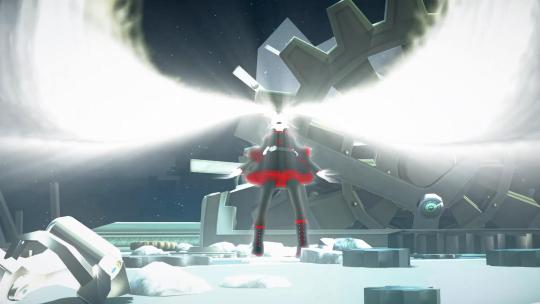
For me, I really like the concept of Ruby’s power cleansing Salem of the effects of the Grimm pools that corrupted her for so many years; reverting the immortal woman back to her original ‘lonely princess’ form from the Lost Fable.
Since the Grimm Pools hypothetically granted Salem the power to control the Grimm, then hypothetically the Silver Eyes---a power born from the Fountain of Light and Creation that negates darkness--- could potentially Salem’s connection to the pools thus severing her connection to the Grimm. Therefore Salem will no longer be able to command the Grimm. I think that a huge part of Salem being a threat to humanity stemmed from her sovereignty over the Grimm. She was even described as being their leader by Raven Branwen during V5.
“…I know the Grimm have a leader…”
That being said, if Salem’s power over the Grimm is taken away---if Salem is changed back to her former self then she’ll no longer be that big of a threat anymore because the thing that gave her reign will be gone for good. Salem the Lonely Princess may return but the Salem the Wicked Witch would be gone for good. Therefore---DING! DONG! The Wicked Witch whose ancient presence haunted Remnant for years will finally be dead!
As for the fate of the original Salem, I’m still sticking to my guns on her receiving a redemption arc since according to the Lost Fable, Salem learning the error of her ways is the only way for her to lift her curse; allowing her to finally die peacefully.
The God of Light said just that. In the Lost Fable, the Brother Gods told Salem that the only way for her to reverse her curse is to learn how to value life.
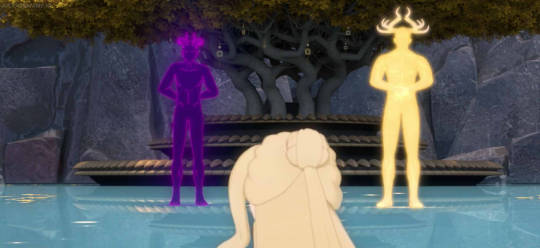
“…When you first came to me, I did pity you. But it is clear now that your selfishness and arrogance have led you astray.”
“What did you do to me?”
“I have made you immortal.”
“Immortal?”
“You cannot die. You cannot be with your beloved.”
“So long as this world turns, you shall walk its face.”
“You must learn the importance of life and death. Only then may you rest.”
That is a lesson that Salem still has to learn and it honestly won’t surprise me if her story wouldn’t officially conclude until she realises the very message the Brother Gods tried to impart on her. That’s my deduction with that.
So to conclude and reiterate my answer to your question---I’d like to think that the final question of the Lamp of Knowledge will definitely be asked by Ruby. Her brief moment with Jinn from the V6 finale where Jinn warned her about summoning her without a question makes me believe that we will get a call-back to this at some point later in the story (hopefully).
Y’know what’s funny? I think in some odd way, Ruby already knows or has somehow figured out the answer to stop Salem herself. A part of me thinks that the one question Ruby both secretly wants and is dreading to have asked of Jinn is “Who can stop Salem?” because in a weird way, I think she already knows in her heart the answer and is fearing its reveal in a sense. Maybe.
In the RWBY Theme ‘Red Like Roses Part II’, there are two lines of the lyrics sung from both Summer and Ruby’s perspectives that makes me think this:
For Summer it was “…I didn’t have a choice. I did what I had to do. I made a sacrifice, but forced a bigger sacrifice on you…”
And for Ruby’s side it was “…I know you didn't plan this. You tried to do what's right. But in the middle of this madness, I'm the one you left to win this fight…”
“…I made a sacrifice, but forced a bigger sacrifice on you…” “…I'm the one you left to win this fight…”
Knowing what I know now in regards to RWBY’s ongoing story, these lines really resonate with me. I know we were told not to take the RWBY themes seriously in respect to the story. However Red Like Roses Part II technically is the first and only RWBY theme where we actually got a sense of Summer Rose as a character.
It’s the closest thing I have right now to knowing anything about her personality outside of the little things that other characters have sparingly said about her over the seasons and in the expanded universe novelizations.
Going off of this alone, I think what I can deduce is that Summer Rose made the choice to go after Salem herself in an attempt to stop her once and for all on her own. However Summer failed in killing Salem but not without leaving a last imprint that might just spark the key to ending the witch’s reign.
And soon, Ruby Rose will basically have to pick up where her mother left off. This is why I like the idea of Summer causing Salem’s scars. I think Summer set out to stop Salem by herself and unlike other Silver Eyed Warriors before her, Summer is the ONLY ONE who came close to actually stopping Salem. Not that she lived long enough to reveal this truth---a truth that will be revealed in time by Jinn (possibly).
And now Ruby, as Summer’s daughter and heir is left to take over where her mother left off and finish the job in a sense. At least that’s my hunch.
Not quite sure if this long response post actually answered your questions Crystal but, like always I hope it does and feel free to please let me know if it does, fam.
~LittleMissSquiggles (2020)
11 notes
·
View notes
Text
It's time to end the myth of emotional self-sufficiency
There’s something much more dangerous out there than the next big flu. It’s a virus, and it will shorten your life. But it’s not a tiny microbe; it’s a meme. It’s the prevailing myth of emotional self-sufficiency. You know this myth—it proclaims that people who need people are pathological, that a deep longing for relationship is sick, and that caring for and about others is co-dependent. It says you should be able to meet all your own needs, and that if you loved yourself enough you wouldn’t need anyone else—so if you’re wanting love, there’s something deficient about you. It’s the myth that shames you for feeling lonely. It’s the myth that has people in my therapy office whispering, “I really want a partner. But I know that’s wrong.” I am so tired of battling this myth alone. I need you with me on this. And here’s why. Humans did not evolve to live alone. It’s not our natural state. We evolved in closely knit bands of about 30 to 40 people. Out there on the plains, or in the forest, or wherever we were, we depended on each other. We hunted and gathered in groups, we sat together around communal fires, we shared food and stories, we slept snuggled up against the cold. It was safer to be part of the pack. You couldn’t survive long alone. Some of the unpleasantness of loneliness is that millions of years of evolution triggers a trace of ancient fear when we’re alone— the outliers are the ones that get picked off by leopards and lions. So, I need you. And you need me. We need each other. It’s in our DNA. We are relational beings We were born to be relational. Day-old deer can run and jump, but humans are helpless when we’re born. For the first months of our lives, we rely so totally on our mothers that attachment researchers say it makes no sense to talk about two separate people. The baby is entirely regulated by the mother. Good attunement by mother to baby builds trust and love. Enough trust and love creates what’s called secure attachment—the inner confidence that you are loved and will be responded to. Secure attachment creates confidence in exploring the world. Securely attached toddlers run off to explore, and then look back at mother, checking that she’s still there. Sometimes they run back, for ‘emotional refueling’ in the form of a loving glance or a kind word. Then they run off again, feeling safe and happy in the world. The myth is that somewhere along the line we grow out of this. But in fact we continue to be regulated by each other. Holding the hand of the one you love calms your heart rate and reduces your cortisol. Research shows that men live longer if they’re married, and women live longer if they have a network of close friends. Think about that—our need for relationship is literally a life and death issue. Our need for touch is another. Loving, caring physical touch causes us to secrete oxytocin, often called the bonding hormone—it makes us feel calm, safe, and happy. Just 40 seconds of being hugged by someone you like causes oxytocin release. But you can’t hug yourself, at least, not very successfully. You need to get it from someone else. Try it. Hug someone and count—you’ll feel the relaxation response switch in. That feeling of closeness with someone else will literally lengthen your life if you get enough of it. Far from being self-sufficient, we physically need each other. It’s a mammal thing In his book, ‘Outliers’, Malcolm Gladwell describes the town of Roseto, in Pennsylvania, which was settled by immigrants from Italy, and which has an extremely low rate of heart disease. It’s not because of diet, and it’s not because of exercise, or genes, or any of the other obvious potential causes. It turns out that the people of Roseto are abnormally healthy because they live together in extended families, and spend a lot of time socializing with each other and visiting with their neighbors. It’s the human contact that makes the difference. Human contact is literally essential for the health of your heart. Is that surprising? Only if you’re infected by a meme that tells you to deny your fundamental nature as a mammal. Ethologists are producing more and more data now that shows that all mammals are programmed for altruism and love. Our previous view of the world as a jungle full of selfish creatures fighting for survival is giving way to one of the world as a tightly knit tapestry of reciprocal relationships. In the early part of the twentieth century we were told that since aggressive chimps dominated by alpha males and their chest-beating ways were our closest relatives, their behavior proved that humans too were wired for aggression and domination. Then, as society shifted, and we became capable of seeing something other than aggression and domination ourselves, we ‘found’ the bonobos—pygmy chimps who live peacefully in matrilineal groups, happily spending their time sharing food and sex. So now we know that at least some of our closest relatives exist in polyamorous, sensual bliss! Lately even rats have been found to be capable of altruism. An experiment showed that a free rat will take the time to free a trapped one, and even save that other rat some of its food. I’d bet if those scientists went one stage further, they’d find that both the freed rat and the one that tripped the latch feel pretty damn good about it. It’s ridiculous to think we don’t need each other. In fact, the opposite is true—the more you give and take love, care, attention and contact with others, the happier and healthier you will be. So humans are naturally relational why has this meme taken such a hold? How did a meme based on avoidance become such a fervently held belief? This meme is all about fear We become avoidant because of fear. Sometimes people have been mean to us in the past and we carry the scars of that trauma—which makes us turn away from love because it has become twinned with the fear of betrayal. The far end of that avoidance response is the supreme isolation of schizoid personality disorder, or the lonely fearfulness of avoidant personality disorder. The near end is believing in the desirability of ‘meeting all of one’s own needs’. All of us have been betrayed at some point. So all of us harbor a little fear connected to the vulnerability of opening ourselves to love, and therefore this meme is seductive. But there’s another reason why it has taken hold, even though it’s one that goes against what makes us most healthy and happy. Primates live in bands, and those bands have hierarchies. The alphas get the girls (or the guy) and the best food. The betas are less highly ranked, but still ‘in’. Further down the scale the pickings are thinner, and you may not get to breed. Further down than that and you’re on the edge, glancing behind you for leopards while you scavenge for what you can get. The fear of being out on the edge leaves you dangerously open to infection by a toxic meme that’s gone viral, like the one I’m talking about. Here’s why. There are two ways to get to the top, depending on what type of society you live in. One is to be more aggressive than everyone else—that used to work, and still does in societies run by war lords (or chimps), for example. The other way is by affiliation—being appealing and friendly, and getting everyone to like you. In the modern Western dating world, affiliation is essential in bagging you a coveted position in the pack. And you don’t succeed in that venture by standing up against a major myth —particularly one about relationships—and saying, “nope, I don’t agree”. That would mark you as weird, wrong, dangerous to be associated with. Unless a significant proportion of your group is secretly thinking the same thing. And I think you are. Because at the deep level of feeling, you know this meme is wrong. Don’t isolate, inoculate. The solution is not to open less to other people. The solution is to open more. The idea that we can—and should—provide for ourselves in every area of our lives, is one that has been sold to us. It’s part of the ideology of the consumer society. We are increasingly reduced--reduced, not empowered—to buying as services the things that used to unfold from natural human relationships: home health care, baby-sitting, massage therapy, spiritual counseling, sexual fulfillment, entertainment, and so on. All these things used to be available to us for free, because we lived with and among other people. Community gatherings met layered sets of needs, in a rich texture of transactions. Markets, barn raisings, harvest times, village dances, and weekly church services, for example, provided opportunities for sharing information, trading, making friends, getting help, courtship, and entertainment. Now we’ve lost that collectivity, and most transactions have become one-dimensional. Even cafes and bars are no longer meeting places—they’re full of isolated individuals staring down at screens, updating their status on Facebook. But god forbid anyone talk to their neighbor—it’s become a weird thing to do, an impingement, something that creates unease. Fight the meme, my friends. We don’t need more self-reliance. Or more narcissistic focusing on ourselves. What we’re blocked in is our relationality: our readiness to receive and our willingness to give. We’ve become so infected with the values of the consumer society that we think we should only give if we’re going to get, and that we should try to get the most return for the least investment. God forbid we love someone more than they love us. Or give our love for free. We think we should provide for ourselves, because otherwise we’d be relying on someone else. And that means taking a risk without any guarantee. We’d rather hoard our own resources, and be all right, Jack. This is the attitude to life that has people in my office feeling both lonely as hell, and ashamed of it—they’ve been told it’s wrong to need people, and they’re scared that their normal attachment instincts are sick. Instead of going inward and trying to meet your own needs, go outward and build yourself a robust network of relationships, a community of like-minded souls that you can laugh with, cry with, listen to, care for and love—the type of network that makes people in Roseto live longer. Then when the inevitable betrayals, bereavements and disappointments happen, you won’t be alone. You’ll have support. Because the truth is, no-one makes it alone. And no-one—unless they’re the sole survivor of a plane crash in a jungle—should even try. Innoculate yourself from the virus by smiling at people, saying hello, getting involved, keeping in contact, leaning into differences, sticking with a friend who’s in hard times, offering to help, forgiving your lover, sending a card, giving a hug, picking up the crying kid, calling your mother. People need people. You’re perfectly normal. Rachel Vaughan MA, MFT
#Humans#Society#Myths#Codependency#Self-sufficiency#Health#Relationships#Love#Mammals#Science#Interdependency#Dependency#World
5 notes
·
View notes
Photo
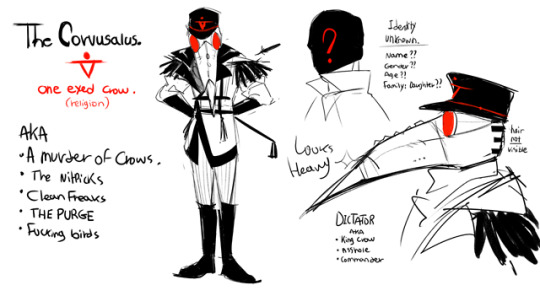

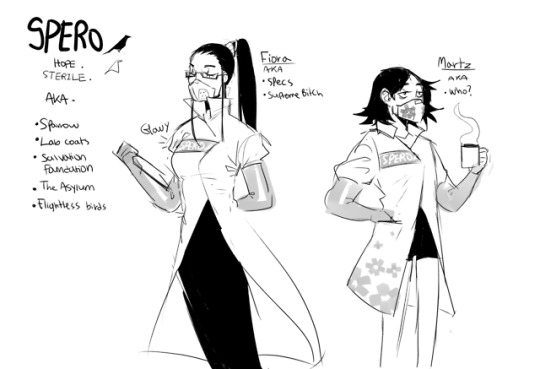
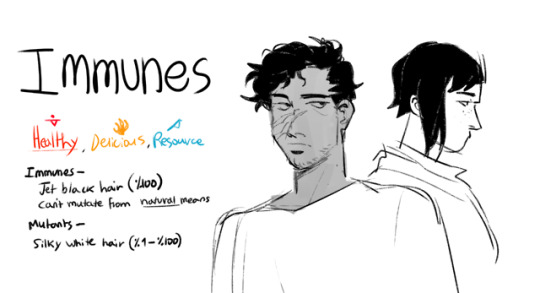

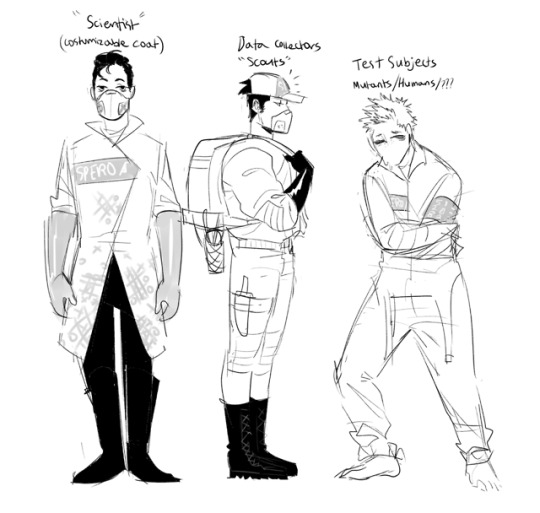
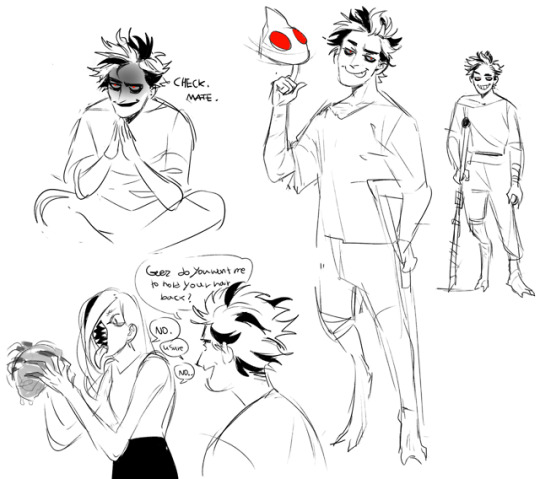

SO uhh a long time ago i made ocs and created a world around them and like a month ago or two i decided to share it with my discord server, I fully drawn everything I’ve worked on, for us to make weird ideas and ocs together to kinda fill that world \o/ so heres a large pile of all of what ive drawn
and under the cut is the full info about the world and the organizations above, a lot of it is explained in points tho (note that im not a good writer and neither is English my first language 💦)
The world has ended decades ago, by a nuclear war that has gone wrong - an easy way to explain post apocalyptic worlds i know. The air is polluted , resources are scarce , however technology is slowly evolving. Humanity has almost gone extinct, only the immune and strong has survived and repopulated the lands. The pollution has created an even bigger problem- Mutants. Mutants are former humans which their genes werent strong enough to over come the pollution and has started mutating and changing. The immune has jet black hair, mutants how ever, are born with white silky hair. The lucky ones are born like any other person, a healthy looking baby. the least lucky ones either die right away, eat their mother still in the womb, born deformed or sick. Most mutants no matter how they were born are weak, and are cursed to be hungry almost all of the time, its hard to satisfy their system as it requires a lot of sustenance. their body deforms as they grow up, struggling to survive and affects their appearance whether internal or external. when their body is exposed to high stress , mutants tend to lose themselves , deform beyond imagination, lose every bit of humanity and go feral. their hunger grow stronger and theyre no longer just mutants, theyre hunters. They prey on the healthy humans and they dont seem to stop, ever. Luckily - The world has been brought to order by an organization a man single-handedly built up from the ground. The Corvusalus The Corvusalus work to cleanse the earth from mutants, leaving only immunes around. they want immediate extermination and has a big army that spreads around and kills any reminiscent to a mutant.
Runs whatever left of the world by dictatorship
Religious - One Eyed Crow
Considered Ruthless
Lawful evil Troops
Trained since young age
very agile and efficient Leader - The dictator
Everyone's leader
Owns you
No one seen his face or family
Endless rumors like- he's a mutant himself, his daughter is a mutant, is he a he anyway ?? Lots of questions
Plays god Uniform
They wear a lot of black rubber and fake leathers
rocking black and white colors with red goggles
Plague masks - resembles your rank, the bigger the higher.
The opposing organization however - Mutiny Mutiny stands united with mutants and humans to save as many lives as they can
strives to get hold of most of the resources around
everyone's enemy
don't take kindly to immunes unless proven themselves (followed by previous back stabs)
literally runs like a gang
chaotic neutral Members -
consists mostly mutants but has a handful of immunes too working along side them
most mutant members despise immunes , some are hostile Leader - commander Brighton
shady af.
can't walk or run on his own, he wants to fight with everyone but is stopped by them for his handicap
a sarcastic goon
insanely smart and cunning
owns the nickname chicken leg Uniform- None they wear what ever they want, it's very easy to tell if you're a mutant by color of your hair, However that just might be their downfall, they're too trusting of other mutants.
Another organization strives to fix the world, so this whole mutant vs humans wouldnt be a problem. they try and fix both mutants and the enviroment , i give you - Spero
Spero believes theres still hope
claims to be everyone's ally
everyone hates them.
questionable morals - no regard to human/mutant lives if it's for science
Lawful Neutral Workers -
Sterile, Hygienic
Food chain - Scientists, Data collectors, Test subjects
Mostly immunes. if youre a mutant everyone are sus of you, and the leader mustve seen your full potential to even be here Leader - Fiora
Head Scientist
Soft spoken, patient
Would sacrifice her own family for science ( she did )
has one sibling left - Martz, in which they both know theyre smarter than Fiora, but Martz keeps a lowkey since theyre lazy af.
Last but not least Immunes are humans that have strong genes that withstand the pollution and possibly many other things. They have the longest life span ranging from 30-50 Has jet black hair.
Organizations vs Immunes Corvusalus : Immunes are untouchable by the corvusalus, but are to bend down to their rules. Immune that works with mutants is to be executed Mutiny : Immunes are hunted by monstrosities and a lot of times mutants that are just - sooo damn hungry. Immunes that seek justice fight for the Mutiny. Spero : Immunes can easily join Spero to help and "save the world". But if you're not very helpful you're to become a test subject and get exposed to horrible experiments.
FAQS
Any more groups? god countless, please feel free to create your own
Do i have to belong to a group? NO! you can be in between, you can be double heck triple agent? traitors ??? were all struggling to survive can mutants dye their hair? Rarely! their hair is silky and dye doesnt seem to stick on ? tho a scientist can come up with a special formula (going against spero) for them guess we'll see bout that
can immunes dye *their own* hair Yeah but it'll never be identical to mutant's , guess we'll depend on science huh
can immune become mutant? A lot of failed experiments by spero has doomed a lot of immunes, many are put down but few had escaped before.
THANKS FOR READING i doubt anyone did worth the shot
#my art#oc#1 fucked up world#is the name of it#yan#corvusalus#spero#mutiny#not gonna tag every oc in there hahh#doodles#concept
297 notes
·
View notes
Text
*** Tumblr 1: Rhetoric and Narratives***
youtube
In this entry, I will examine these critical questions: What central narrative(s) does this artifact tell through its rhetorical elements? In doing so, what values does it promote or ignore (who does it include and exclude)? In which ways is this narrative (ethically) productive for society, in which ways is it limiting, and is it more productive or limiting?
To investigate these questions, I examined Taika Waititi’s 2019 movie Jojo Rabbit as my rhetorical artifact. Through strong character development and a unique view of the human condition, Jojo Rabbit creates a central narrative that nobody is innately evil, and that hate is taught through society (and thus can be untaught). Overall the narrative is productive because it ethically demonstrates how togetherness can overcome hate even in the worst of situations.
Jojo Rabbit (Taika Waititi) is a film adaptation of the book Caging Skies (Christine Leunens) that depicts the life of a young boy – named Jojo Betzler – in the Hitler Youth during the 1940’s. The movie covers Jojo’s life from the mid-war era to the liberation of his German town following the collapse of the Third Reich. In the beginning, Jojo is completely swept up in the Nazi fanaticism, and even has an imaginary Hitler friend (but it is how his 10-year-old mind envisions Hitler, not actual Hitler). After getting injured during a Hitler Youth camp excursion, Jojo is sent back to his hometown where he eventually discovers a young Jewish girl named Elsa living in secret in his home under the protection of his mother. Faced with a dilemma that challenges everything Jojo was raised to believe under the Nazi rule, his character undergoes great moral changes to eventually realize that Jews are just like him; and that they are not the horrifying monsters that his upbringing taught him to see them as. Thus, the film ends with Jojo and Elsa becoming great friends by the time their town is liberated by Allied forces.
One way the narrative that “hatred is taught” is prevalent in Jojo Rabbit is in the movie’s opening sequence, where Jojo is attending a week-long camp in the mountains for the Hitler Youth. At this camp, young boys undergo daily activities that are reminiscent of modern Boy Scout camps, such as basic survival skills and group activities in the outdoors. However, they also participate (in a satirically funny manner) in Nazi-centered fanaticism drills to mold their minds into a certain way of thinking. These drills include how to make a swastika stance with their bodies, a group-think session where they all contribute to a drawing of what a Jew is in their minds, and they cap off each night with a book burning rather than a typical campfire. The Jew drawing scene especially encapsulates the narrative that hatred is taught, as in this scene one Hitler youth child shouts out “Add fangs!” followed by another stating “And a serpent’s tongue!” The drawing is then completed when a young girl says “Scales!” to which the Nazi woman doing the drawing and leading the session replies, “Ya! Scales, because once upon a time a Jewish man mated with a fish. The Arians are 1000 times more civilized and advanced than any other race.” This statement is then met with great excitement among the children, as it emphasizes beliefs that they have already had beaten into their minds by the society that’s raised them. These ideas are all they know, and thus affirmation of their opinions only strengthens the hatred they have for these people in their minds. This scene is a shining example of the narrative that “hatred can be taught” since it features hatred, quite literally, being taught, and all the children clearly taking it in. It is through this unique view into the human condition – and what life may have been like growing up in Germany in the 1940’s (satirically) – that we are first introduced to the movie’s central narrative.
Another way the narrative is evident is when Jojo first encounters Elsa, a Jewish girl living in secret in his home under the protection of his mother. Up until this point, Jojo is a fanatic, 10-year old Nazi who believes in the power of the Third Reich not because he chooses to, but because he has never been exposed to another way of thinking in his life. When he meets Elsa, he is equally terrified and dumbfounded. He’s confronted by his worst fear: a Jew. However, she’s not this fishy, fanged monster that he always pictured. Instead, she is a completely normal girl, whom he actually has a crush on. His instincts kick in at first, and he reacts in the only way he’s been taught: by attempting to assert dominance since he has been raised to believe that he (of Arian race) is far better than Elsa. Jojo says, “You are weak, like an eyelash. I am born of Arian ancestry. My blood is the color of a pure red rose, and my eyes are blue…” This line is representative of the social truths that Jojo has been taught to accept. As explained by Palczewski, Ice and Fritch (2012), social truth is a set of “…beliefs and values that do not refer to some objective reality, but to social reality – those beliefs about what is right that people have arrived at together.” Jojo’s social truths from the Nazi society have taught him hatred, and he has accepted (and embraced) that up to this point, emphasizing the central narrative.
With this central narrative comes the idea that hatred can also be untaught. After what Jojo says to Elsa, she reacts by wrestling and pinning him, saying, “Break free great Arian. There are no weak Jews. We were chosen by God. You were chosen by a pathetic little man who cannot even grow a full mustache.” Here, Jojo is taught the lesson that he is indeed not the strongest person and that he clearly has no power of Elsa, despite what he was raised to believe. This is the beginning of his moral growth as a character, and through his character development, the central narrative is completely brought to bear. Jojo’s character is the foil through which we see how hatred is imbued in someone, but it is also through Jojo that we see how hatred can be removed and replaced with a sense of togetherness and love, as by the end of the film, Elsa is his greatest friend.
There are both advantages and disadvantages to this narrative, though there are mostly advantages. One advantage is that the message is incredibly positive and lacks in any negative meaning. It is one that states that hatefulness can be addressed and resolved, a much more positive outlook than simply believing that hate is innate and cannot be changed. Therefore, ethically this message is incredibly productive for society as it encourages proper moral developments, especially with the young. It is hard to find any disadvantages of this narrative. One disadvantage could be that by believing hatred is only taught, society is seen to be completely to blame for all wrongs committed by an individual: not the individual themselves. In other words, the narrative is almost giving excuses for those that act morally/ethically incorrectly. This disadvantage is certainly not very strong though and is hardly even a disadvantage, and as such it does not affect the overall positivity and importance of the central narrative.
Igartua and Barrios further explain how narratives can directly influence societal behavior by discussing how narratives in the film “Camino” (Fesser, 2008) caused an empirical change in the audience’s views on Opus Dei and religion. They tested this by – in simple terms – asking participants in the study to fill out questionnaires both before and after the testing. These questionnaires determined their overall connection to the main character of “Camino,” as well as their feelings towards Opus Dei and religion (and they attempted to determine how involved in the narratives each participant was likely to be). The results empirically demonstrated that narratives in film can directly affect the audience’s opinions on the subject matter, as the participants were found to have more hatred towards Opus Dei and religion after the film; a belief that aligned with the central narrative of the movie. This furthers the impact of films like Jojo Rabbit, which have messages intended to change the audience’s thoughts on certain topics. In fact, Jojo Rabbit closes with a quote clearly stating the message the director wanted to tell the audience: “Go to the limits of your longing. Let everything happen to you: beauty and terror. Just keep going. No feeling is final.” Whether or not the film does successfully change the audience depends on each individual, but Jojo Rabbit’s unique view into the human condition with what life would be like as a child in such a tough environment truly does try to reach out to the audience and deliver its central narrative on a personal level: something that is possible as shown by Igartua and Barrios in their study.
In summary, Jojo Rabbit’s phenomenal character arc and moral development with Jojo – along with the unique view into a radically different society from a child’s perspective – allows the film’s central narrative that “hate” is something that is taught (and can therefore be “untaught”) to be delivered effectively to the audience; enabling them to potentially embrace the ideals the films puts forth and directly influence modern societal truths.
Igartua, Juan-José, and Isabel Barrios. “Changing Real-World Beliefs With Controversial Movies: Processes and Mechanisms of Narrative Persuasion.” Journal of Communication, vol. 62, no. 3, June 2012, pp. 514–531., doi:https://doi.org/10.1111/j.1460-2466.2012.01640.x.
Palczewski, C. H., Ice, R., Fritch, J. (2012). Narratives. In Rhetoric in Civic Life (pp. 117- 146). State College, PA: Strata Publishing, Inc.
Jojo Rabbit. Dir. Taika Waititi. Searchlight Pictures, November 2019. Film.
1 note
·
View note
Photo

RETRIEVED FROM THE INTERNAL DATABASE OF HER MAJESTY’S SECRET HELLSING ORGANIZATION, NOT FOR PUBLIC RELEASE OR FOR COPY . ORDER SIGNED BY SIR INTEGRA FAIRBROOK WINGATES HELLSING HERSELF .
of all supernatural creatures that have crossed paths with the van helsing clan, & later the hellsing organization, none stand out & as a memorable as THE VAMPIRE . the family whose namesake & history intertwines with the organization has painted its legacy with the blood of these monsters, they have found their greatest feats in slaying them & protecting humanity from their corruption . it is no coincidence then that of all beasts that reach the shores of the united kingdom, the vampire is our most common threat . there are many factors which make it feared among all other creatures, the apex predator of a food chain beyond the limits of human comprehension, & the subject of the hellsing organization never-ending crusade to hunt it to extinction :
SECTION #001 — PHYSIOGNOMY .
VAMPIRES ARE LIKE CHAMELEONS, sharing the figure & features of a human, able to hide & lie in wait among its natural prey, with an appearance subject to change of their own will . of course, the weaker they are the easier it is to distinguish them from your fellow man, you can quite easily assess the threat level of any given vampire by how well it hides itself among a crowd of people . weak vampires may also be unable to truly shift in appearance, like many of their abilities, such a skill is something to be learned & mastered . the common traits that set a creature of this nature apart from any human are RED EYES & SHARP SHARK-LIKE TEETH . as mentioned previously, more powerful vampires may chose to hide these traits, the red in their eyes hidden beneath a fake glint, though in darkness it is still quite visible . they might also cover their fangs, but it is important to note the canines of this creature’s maw, for they will ALWAYS remain sharp . weaker variations can also lessen their vampiric traits through restraint from blood consumption, which might provide the slightest cover, but in said state a vampire’s nature as a shambling corpse is most well seen .
starved of what satiates their hunger, a vampire’s form will begin to slowly wither & they will grow weaker . given enough time a vampire may return to a corpse-like catatonic state, though the length of this process may itself take months or years depending on their inherit strength . human blood is what fuels their vampirism, what allows them the power to prey on humanity, & without it they are fated to revert to their truest form, the corpses they should have been .
it was not always this way, vampires of old were quite easily distinguishable from humans, sharing only in the humanoid figure but with more telltale signs of their status as apex predators . they have since EVOLVED to hide themselves among humanity, a natural consequence of their never-ending thirst for blood, & only the most ancient of vampires retain elements of their historical depictions . to a trained eye, however, even the vampires of now may be told apart from people . while humans possess a solid composition, a vampire’s is more shadow-like, shifting endlessly in infinite states of dishevelment which make one tense upon eye contact . it is hard to notice just how inhuman vampires appear, but under the right light conditions, through the right photographs, one can tell .
SECTION #002 — LIFE-CYCLE .
according to legends, vampires are not born, THEY ARE MADE, a curse spread from one host to another . it is true, that vampires do not & can not procreate ( with humans or each other ), but the beginnings of a vampire are a far more complicated process with endless, situational variations . vampirism is a curse, & thus, it has a source . though it is impossible to trace it down to any single progenitor, it is foolish to believe that people become vampires simply through the spread from one infected patient to another . a human may become a vampire in numerous ways, either they are sired into their unholy existence by someone already afflicted, or they become vampires from their own hubris . vampirism is an illness born out of HUNGER, hunger for many things, be it eternal life, or power . the latter is the most common narrative, & thus many who seek greater strength beyond the limitations of humanity may become vampires out of pure desire . they might perform forbidden rituals of the occult, sacrifice their soul to all manner of devils, gods & specters or something as simple as satiating their thirst with the blood of their fellow man .
once afflicted, a vampire’s life-cycle is virtually limitless, able to live for an insurmountable number of years beyond that of a human . it is this longevity that makes the vampire one of the last supernatural creatures to stalk the edges of our perception . many other monsters of its ilk have since died our or have been hunted to extinction, YET THE VAMPIRE SURVIVES . is this simply down to their prolonged existence ? is it their status as the top of the unholy food-chain that allowed them to survive when their comrades did not ?
NO, while those are factors to consider, the vampire continues in spite of its kin for it draws its satiation from a different source . while beasts may feed on the nutrients present in human flesh, after all, we are red meat, vampires hunger for blood . like all creatures, humans possess a SOUL, their very essence contained within that allows to exist & perceive, & BLOOD IS THE CURRENCY OF THE SOUL . drain someone of their blood, quench your thirst with it, & soon you will be allowed to peer into them, their thoughts, their feelings & even their very memories . by draining a person’s entire bloodstream, vampires are able to absorb their soul, granting them further power beyond simply that which is gained from normal feeding . vampires are then able to do with these souls as they please, should they know how to utilize them, summoning their victims as familiars, using them to hone their skills & abilities . making them the most feared among the forces of darkness & the last surviving vanguard of the night . it is this discovery, made by the late arthur van helsing, that truly explains the source of the vampire’s abilities, & the need for its TOTAL ERADICATION .
SECTION #003 — THREAT .
vampires posses an array of abilities that prove deadly to any human unfortunate enough be become their prey . the exact nature & number are ill-defined & so not even the hellsing organization can provide a complete assessment of the capabilities of a vampire . vampirism is a tailored curse, one that suits each corrupted individual down to their need . in essence, THERE IS NO UPPER LIMIT TO THE POWERS BORN OF VAMPIRISM, as each encounter may differ in its own unique way, & thus each mission is required, according strictly to the hellsing organization’s internal regulations, to perform an extensive reconnaissance operation before a target is engaged in combat .
however, there are shared traits between many of the vampires slain by hunters & soldiers of the organization, which are to be memorized & understood as an observable pattern within vampirism . it is, after all, an affliction of those who hunger for POWER, & in that shared origin one will find common abilities . they are as follows :
ENHANCED STRENGTH, AGILITY, ENDURANCE & RESILIENCE — self-explanatory, vampires possess capabilities beyond any mere human, able to move faster than the eye can perceive, to tear through flesh like it is paper, to outlast trained soldiers in battle & to survive a hailstorm of bullets . they are not to be underestimated, as they can rip apart an overconfident squadron in seconds ;
REGENERATION — again, self-explanatory, any wound a vampire is caused can be healed quickly without visible scarring . more powerful & skilled the vampire, more potent their regenerative abilities, able to even regrow or reattach limbs which have been severed . it is said that a strong enough vampire may even regrow their head ;
LONGEVITY — decay & rot are of little concern to a vampire, they are corruption inhabiting a body, & given a consistent stream of human blood they can live on for as long as they desire, nigh immortal if not for the existence of bodies such as the hellsing organization to seek their end ;
INTANGIBILITY — if they so choose, a vampire may become immaterial to the world, & pass through any matter it desires . of course, this is a skill uncommonly seen, & a technique that necessitates a degree of mastery before it is to be used offensively . the only know material to cancel it out is SILVER ;
PERCEPTION — a vampire’s ability to perceive the world around them is enhanced & honed specifically for the hunting of humans, thus their hearing, sight & sense of their surroundings reaches far above ours . they can hear single a heartbeat among a crowd from miles away, can see their prey through solid objects & perceive the surrounding area to such a degree that a plan of attack may be formed in seconds ;
TELEPATHY & HYPNOSIS — is it because of this enhanced perception that vampires have to the ability to stalk a person through their thoughts, able to project their desires onto a potential victim & draw them closer . as well, they may simply sense a human’s thoughts & emotions when they are close by without needing a single drop of blood . of course, this is not a common ability, & is a skill to be mastered before it sees use in the vampire’s hunt ;
TELEKINESIS — certain vampires may possess minds so powerful as to move solid objects . while another infrequent ability, it may be used by a vampire to drag their opponent off their fit & into their claws, or simply to levitate objects & even themselves to be used as weapons or for better spacing when engaging in combat ;
refer to previous sections for anything missing from this list .
SECTION #004 — SPREAD .
one might imagine vampirism to travel among the populace like a plague, an illness passed on from an infected individual to another, but it is a mistake to think of it this way . vampirism is no common affliction, & though it can be passed, a more correct assessment would be to say that VAMPIRISM IS A CANCER . as previously mentioned, one might give into becoming a vampire because of their lust for greater power . how, then, is vampirisim granted ? does it simply manifest out of thin air & infect those wanting ? of course, the answer is much more damming . vampirism is a curse which is present within us all, any human serves the potential of becoming a vampire, should they find themselves under the right circumstances . it is an affliction born of humanity’s own hubris, manifesting itself as vengeful beasts that seek nothing but our destruction .
we all born into this world with a corruption in our hearts that may overtake us & turn us into monsters, each of us serves the potential of becoming a vampire, but to then imagine a necessity for the culling of fellow humans in an effort to stop the spread of vampirism is monstrous in & of itself . the circumstances by which a human may turn are so specific & uncommon that billions of us can go our entire lives without knowing we are all corruptible . in order for one to turn themselves, they necessitate a pathological hunger for power without limit, not power over others granted through the hierarchical systems we live under, power beyond the constructs we agree upon . power to dominate without restraint & to do it as they please . as well, another of the few known triggers for our inherit corruption is desperation beyond measure, a willingness to sacrifice one’s own humanity in order to survive in the face of certain doom . combine these two circumstances, give it human blood of any sort, & you just might have witnessed the beginnings of a self-made vampire .
it is for this reason that vampirism is so uncommon among humanity, despite every individual presenting a potential risk of the affliction, & why, in order for the lineage of vampires to continue, it is customary for the vampire to turn humans into more of its kin . this too can be an uncommon sight, such a ritual, while easy to perform, can be deeply personal & born of incredible circumstance . it is quite easy to understand that granting another immortality & power beyond measure, against their will or because of it, while sacrificing their humanity is not a decision to be made lightly . thus, it is more rational to fear DEATH by a vampire’s hand rather than the granting of UNDEATH . the way by which a human is turned is quite simplistic in comparison, it requires them to be drained of most if not all of their blood by a vampire’s bite, allowing the plague to spread through their body from the touch of fangs alone, & then they must be given a taste of vampiric blood . vampirism is an unstable corruption, one that can destroy a human’s mind & body if not contained by a vampire’s blood . self-made vampires need not worry, but those being turned NEED vampiric blood within their system lest the poison take away their rational mind & rot their body to the core, turning them into GHOULS .
SECTION #005 — WEAKNESS .
almost in spite of their great power, dispatching a vampire can be quite easily done . in ages past they were quite weak to objects of religious significance, such as crosses, & unable to withstand the radiation of the sun, but today most vampires have evolved past such classical weaknesses . regardless, SILVER remains their natural deterrent, contact with it will burn their skin & any wound they contract from the metal is either permanent or harder to heal . as such, soldiers of the hellsing organization are outfitted with silver plated rounds of both exploding & standard variety, designed specifically by our research & development department to incapacitate most types of vampires . blessed silver is found to be double as effective, & thus we also provide standard ammunition forged from melted silver crosses provided to hellsing by the manchester cathedral . however , these are in short supply, & are only to be used under dire circumstances as a last resort or if a vampiric threat is assessed to be greater than normal, as per our internal regulations .
when attempting to incapacitate a vampire, one should make sure to aim for one of two potential areas of their body, either the head or the heart . destroying either/both of them or severing from a vampire will, in most cases, kill them instantly without any chance of regeneration . even a well placed non-silver bullet may dispatch a vampire if aimed well enough, & thus precision with a fire arm is the difference between life & death . as well, while not commonly used by the organization, FIRE can prove a useful tool when dealing with vampires, able to burn them at a rate similar to contact with silver or, at the very least, weaken them enough for a well placed shot . vampires are scarcely immune to explosives, as well, & can be incapacitated if one were to explode one/both of their vital points . dispatching an entire group of vampires is generally better done by utilizing explosives than engaging them with firearms .
THIS ENTRY HAS BEEN COMPILED FROM RESEARCH INTO THE OCCULT DONE OVER THE MANY GENERATIONS OF THE VAN HELSING FAMILY, WRITTEN & SIGNED BY SIR INTEGRA FAIRBROOK WINGATES HELLSING .
#* ( could've been so much better ┊ ooc. )#* ( signed & printed ┊ headcanon. )#* ( doing hirano's work for him ┊ worldbuilding. )#eat your heart out kouta hirano#i WRITE hellsing now#it's mine#*beats hands against chest like a gorilla while screaming*#blood //#blood mention //#cancer mention //#illness mention //
28 notes
·
View notes
Text
Marvel Cinematic Universe: Avengers: Age of Ultron (2015)

Does it pass the Bechdel Test?
Yes, once.
How many female characters (with names and lines) are there?
Seven (30.43% of cast).
How many male characters (with names and lines) are there?
Sixteen.
Positive Content Rating:
Three.
General Film Quality:
Significantly flawed, and well-known in fandom for it. Unpopular opinion? I still think it’s better than the first Avengers film.
MORE INFO (and potential spoilers) UNDER THE CUT:
Passing the Bechdel:
Natasha and Laura pass in a single-line trade. It’s sooo close to not counting.

Female characters:
Natasha Romanoff.
Wanda Maximoff.
Maria Hill.
Helen Cho.
Peggy Carter.
Laura Barton.
FRIDAY.
Male characters:
Tony Stark.
Steve Rogers.
JARVIS.
Thor.
Clint Barton.
Strucker.
Pietro Maximoff.
Bruce Banner.
Ultron.
Sam Wilson.
James Rhodes.
Ulysses Klaue.
Heimdall.
Nick Fury.
Erik Selvig.
Vision.
OTHER NOTES:
Everyone talking about Strucker like we already know who he is...
The “Shit!”/”Language!” gag was funnier before they hung a lantern on it. Not least because it takes almost a full minute before Tony harks back to it (fifty seconds, actually. I checked). If you’re gonna make a Thing out of it, you gotta follow up immediately, not after fifty seconds of cutting around to different character intros and action shots and a whole lot of other dialogue.
Urrgghh, ok, I’m going to break my standing rule about not discussing source material, because we gotta acknowledge the colossal wrongness of re-writing the Maximoff twins - canonically Jewish Romani - as willing volunteers in a Nazi science experiment. It gets worse the more you think about it. There are a few things about this movie which generated significant negative outcry, and this incredibly offensive decision is one of them.
Tony and Thor fighting over who has a better girlfriend does have a certain charm to it. If you’re gonna have a testosterone-off, it might as well be about how great your partner is.
I got a zero out of ten on this out-of-nowhere forced romance crap with Natasha and Bruce. We’ll come back to this later.

“I will be reinstituting Prima Nocta,” Tony declares, as he prepares to lift Thor’s hammer and thereby theoretically take charge of the Nine Realms. Primae noctis (believed to in fact be a myth) refers to a supposed Dark-Ages law that granted lords the ‘right’ to take the virginity of any newlywed peasant woman who lived on their land. So, this is a wonderful little rape joke from Tony (or, y’know, not so little, since primae noctis in reality would make Tony a serial rapist). Ha ha ha ha. Hilarious. Good one.
I’m really mad about the parts here that are total garbage, because mostly, the revels sequence has a nice low-key quality to it, good solid team dynamics.
I can’t fucking believe that they played the ‘and then Bruce falls with his face in Natasha’s cleavage!’ gag. I cannot believe it. Is this a disgusting frat-boy comedy from the nineties?
Honestly, Tony, just shut up and admit that you KNEW from the get-go that it was wrong to try and make Ultron happen (that is why you kept it secret from everyone else to begin with); don’t try to defend the decision now that you’ve got a ‘murderbot’ on your hands. Take responsibility for a bad choice instead of talking shit about how you had to and everyone else is just too short-sighted, damn it!
Andy Serkis is delightful.
The Iron Man/Hulk fight absolutely KILLS the momentum of this film. It goes for way the fuck too long (eight minutes) and has no narrative significance at all. Pro tip for action scenes: they should always be driving the story somewhere. You can pull off eighty minutes of action so long as your plot is advancing alongside/within it.
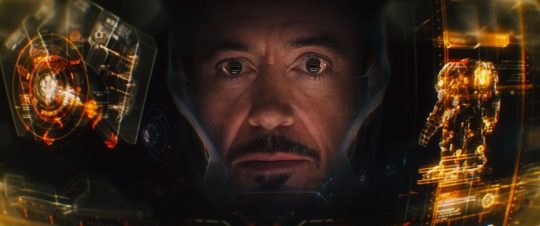
Also, Iron Man causes a huge amount of additional damage during this fight, in the service of the aforementioned pointless action. His efforts to minimise Hulk’s effects are extremely poor, and calling in his relief organisation to clean up after the fact does not negate that.
Gotta love that throwing a wife and kids at Hawkeye at the same time as we suddenly start pushing this Natasha/Bruce thing. That’s not transparent at all. I also understand this to be a major deviation from Clint’s identity in the comics, and very unpopular with fans for that reason, but regardless; reinventing him as a family man to reset the romantic blather after baiting fans with the possibility of Clint/Natasha in the first Avengers movie is such a shitty move. I was not invested in the ship myself and would have loved to have them reinforce the just-friends relationship between Hawkeye and Black Widow, because there are not enough platonic friendships between compatible men and women in fiction, but 'they’re not interested in each other because they’re busy with someone else!’ is a weak reinforcement indeed. Less forced romances, and definitely less token wifey who exists for no other Goddamn reason at all. This comes out of nowhere, and not in a clever-surprise kind of way.
“You still think you’re the only monster on the team?” Natasha says, after telling Bruce about her sterilisation. This earned a HUGE backlash, and for good reason - despite all arguments about how what Natasha meant was that her being raised to be an assassin makes her a monster, the direct implication of her words as they are phrased and as the discussion is structured is that her inability to have children makes her monstrous, and that’s deeply offensive. It’s also completely in keeping with a narrative which is often played out against women, in which their value as people is attributed directly to their ability to produce offspring, so it’s not even like this outrageous implication of monstrosity - the corruption of what it means to be female! - is that unusual. It’s awful, but not unusual. Add on the fact that 1) Natasha’s nightmare-flashes specifically foregrounded her sterilisation over all other details of her training, supporting the idea that she believes that it’s what makes her irredeemable (instead of, y’know, all the murdering and stuff), and 2) this is Joss Whedon’s work and he is OBSESSED with highlighting the womanhood of his female characters and treating it like their defining trait while also variously punishing them for it, and you’ve got every reason to interpret this terrible fucking line as exactly the heinous thing it (presumably, unwittingly) seems to be.
Steve ripping a log in half with his bare hands is the funniest thing in this whole movie.
Thor’s brief side-adventure with Erik Selvig is pretty out-of-place. He just...goes for a swim in a convenient magic pond that Selvig chances to know about. Seems normal.
Ultron is full of such boring, empty rhetoric. Reminds me of Loki in The Avengers, with all that sound-and-fury.
I love Paul Bettany.

Man, they sure do find Natasha instantly. It’s almost like making a damsel-in-distress of her who needs to be rescued by the team was completely meaningless...
Breaking my no-BTS rule (since I already have done for this movie at this point) because it’s well-known how Joss Whedon ordered Elizabeth Olsen not to show exertion or ‘ugly emotion’ on her face in this film, because God forbid she compromise her attractiveness by being human. Joss Whedon is not human; he’s fucking trash.
The final fight sure does just, y’know, get to a point where it ends. They really did not ratchet up the tension over the course of the Sokovia conflict, it just goes along until it stops (also, they say Sokovia is a country, but then they never call the city anything else, it’s just Sokovia. Is the city conveniently named after the country (very confusing), or is it a city-country, like The Vatican? I kinda assume it’s option three, which is that no one bothered to care because it’s just some fake European placeholder anyway and we’re not supposed to notice such a dumb oversight).
“I was born yesterday.” This is the best quip in this whole thinks-it-is-way-wittier-than-it-is movie.
Helen Cho deserved better than to be a prop rapidly dismissed and then just trotted past at the end for an ‘oh, she survived, btw’.
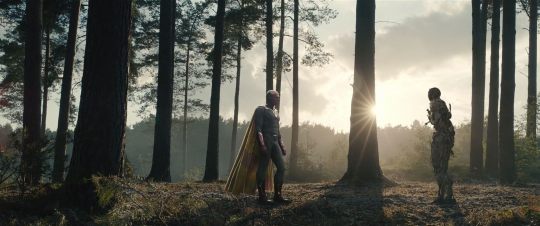
Back when I reviewed the first Avengers movie, I said that I considered that film to be heavily overrated, so maybe it’s not such a surprise that I actually like this one better. The two primary problems I had with that first film were the overly simplistic plot, and the fact that most of the characters were OOC compared to previous films, and this movie does do better on both scores, so I feel more engaged by it, and less annoyed. That said...this movie has still got a lot of problems, and those include iffy characterisation and a plot with various holes, nonsensical complications, and conveniently ignored or smoothed-down dynamics. When I say I like this movie better than the first one, I mean just that: I like this better. That does not mean I am here to sing its praises.

The tacked-on romance is part of the problem - for Clint as well as Natasha (but especially for Natasha). After Hawkeye was so heavily under-used in the first film (and his slightly-ambiguous relationship with Black Widow was the only human element that made him a character instead of a prop), Age of Ultron attempts to compensate by giving Clint a personal life, in the form of a magically-appearing heavily-pregnant wife and a pair of nameless children. The function of this family appears to be 1) to give Clint a reason to not be interested in Natasha, and 2) to ‘humanise’ him by giving him something to fight for and get home to, because we all know nothing legitimises a character quite like some otherwise-irrelevant dependents. Want a man to seem lovable and important? Give him a pregnant wife. That’s what women are for, anyway, right? To enhance a man’s story? In this case, to provide a man whose purpose in the story has been contested with insta-personality, because ‘he’s secretly a family man, ooh, twist!’ is way better than having to spend time on giving him something to do in the plot that is actually meaningful in some way. Great logic. Makes Hawkeye super dynamic, right?

Natasha, unsurprisingly, is hit much, much harder. As the only female avenger and one of only two prominent female characters in a cast which has seven-to-nine male characters of equal or greater importance/screen time (YMMV on whether or not you think Fury and Vision count for that list), the pressure is already on for Natasha to be served up a quality narrative, because if she doesn’t get one, well...she doesn’t have six-to-eight alternative characters to pull the weight for her gender. The best solve for this problem would be to avoid the ‘Token Woman’ cliche in the first place, but since we missed that boat...not having the personal story of your only primary female character revolve completely around her womanhood and her catering to heteronormative expectations of a love interest would have been a good choice. This weird, forced, chemistry-free thing with Bruce Banner? Was the worst thing they could have used to define Natasha’s presence in the film. It sticks out like a sore thumb every time they have an awkward interaction, and it leads in to that atrocious ‘monstrous infertility’ element (though that particular egregious mistake could have been included with or without a romantic blunder, it...probably wouldn’t be, and we’d all be the better off). Even the Hulk-whisperer part of the relationship - while not awful on its own with all the unnecessary romance and Unresolved Sexual Not-Tension removed - serves to highlight Natasha’s female-ness by making her the soft maternal figure for the team, because God forbid one of the other male members of the team be asked to ASMR-speak to the Hulk while delicately caressing his hand. If Natasha’s presence in the first Avengers film leaned too heavily on her gender identity as a defining trait (and it did), this movie doesn’t fix that problem at all: it doubles down on it.

The good news for most of the excess of male characters is, they by-and-large don’t feel as OOC as they did in the first film. The boorish romantic entanglement aside, Bruce Banner is still a naturalistic character highlight (all credit to Mark Ruffalo, who probably doesn’t know how to turn in a bad performance in the first place), and Thor’s dialogue is way less ridiculous this time ‘round, so he lands a lot closer to his personality from previous films simply by virtue of sounding like the same guy (unfortunately, the plot does not have the faintest idea what it wants to do with him as a character). Steve Rogers is still being written as if being Captain America is his character, which is a fundamental misunderstanding of his identity, albeit one which conveniently allows him to behave in a stereotypical self-righteously bland manner, thus avoiding the need for any nuance in his perspective or actions. This borderline fanfic-flamer ‘Captain America is my least favourite character so I’m going to write him as a boring stick-in-the-mud and then hopefully no one else will like him either!’ approach doesn’t grate quite as badly as it did in the first Avengers, and it can’t cancel out the innate level-headed charm of Chris Evans, so as disappointing as the bias is, it’s still a better balance here than it was last time. The one character who is not so flatteringly handled, however? Also happens to be the one who was arguably handled best last time, and unfortunately, he’s the one who is essentially treated as the ‘lead’.

The big problem for Tony Stark is that this movie is not interested in digging in to the pathos of any character, it’s all-flash-no-substance on that front, and Tony really, really needed a less heavy-handed slathering of ‘afraid of what might come (feat. messiah complex)’ to motivate his actions and reactions in this film, because without any exploration he’s basically just a billionaire kid playing with matches. If this were an Iron Man film (either the first or third one, anyway), we’d get into some tasty deconstruction of Tony’s mental state and confront his hubris, etc, and - crucially, most crucial of all, it’s a mainstay of all his past stories in the MCU - Tony would own up to his mistakes, listen to the advice of those around him, and take contrite steps toward fixing the problem not just in the direct sense of ‘beating the bad guy’, but also in the personal and emotional sense of working on his own flaws and making amends with the people he hurt along the way. This movie offers none of that. To begin with, Tony’s ‘I know best and I will not be taking any questions’ approach to creating Ultron feels like a significant step backwards in his character development so far (Iron Man 3 was specifically about addressing his PTSD and associated tumultuous emotions surrounding the fear of imminent alien invasion, so his reactionary and secretive behaviour in this film feels particularly out-of-touch with a mental reality Tony has been explicitly working on for the past couple of years); Tony is actively aware that it’s a bad call and thus hides it from the other Avengers until it’s too late, and then he’s bizarrely unrepentant about his mistake. Worst of all, he actually attempts to repeat that mistake, only worse, late in the film (the fact that his idiotic ‘mad scientist’ pep talk actually convinces Bruce to help him again is the weakest character moment for Bruce outside of the aforementioned romance crap). The plot rewards Tony’s second, far worse mistake, in the creation of Vision, who turns out to be ‘worthy of wielding Thor’s Hammer’ and whatnot and conveniently provides every necessary skill to defeat Ultron in a deus ex machina so overt you could use it as a textbook example, so even though Tony had absolutely no way of knowing that he’d get a good result this time and almost every reason to believe he’d just compound the existing problem, his reckless disregard for the literal safety of the planet is treated like a good thing because it happens to work out this time, and they just kinda sweep under the rug the fact that Tony is playing God (and being uncharacteristically stupid and selfish about it - in other films, Tony is normally only reckless with his own safety, and it’s when his actions spill out into unintended consequences for others that he realises the error of his ways and cues up a positive learning curve; it’s what makes him palatable). At the end of the film, once Ultron is gone and Tony has thrown some dispassionate wads of cash into ‘relief efforts’, he strolls and quips and eventually drives off into the sunset in his expensive car, with nary a mention of, I dunno, maybe a little guilty conscience? Maybe a hint of having learned a valuable lesson? The closest he gets is just suggesting that it might be time he retires from Avenging, but neither he nor anyone else lets on that there’s a need for serious self-reflection. The Tony Stark in this movie is the nightmarish male-fantasy version of the character, the playboy with the cool tech and no limits who does whatever he wants and then...literally rides off into the sunset in the end, no muss, no fuss. He’s kinda like a complete reversion to his original self, pre-Iron Man, frittering money around and designing weapons of mass destruction while convincing himself he’s bringing peace to the world one explosion at a time, but that Tony has no business here, seven years of character development down the track.

While we’re talking iffy characterisation, we should also segue into plot, and that’s something we can do easily enough by looking at our villain, Ultron. Calling Ultron an actual character feels...ambitious. He’s a CGI robot full of empty rhetoric and, you guessed it, more of those quips that this movie has in place of any meaningful dialogue. I’d call him self-fellating, but he ain’t got nothing to fellate, so instead he just blathers a lot in a manner that sounds vaguely poetically intelligent but is, upon a moment’s consideration, just vapid nonsense (much like Loki in the first Avengers, as noted above, but at least Loki had the benefit of a flesh-and-blood actor delivering his lines with conviction; James Spader does solid work as the voice of Ultron, but trying to make a CGI robot who spouts a school-kid’s attempt at edgy philosophy sound like a genuine menace is an uphill battle). Speaking of genuine menace, I assume the reason the film is called Age of Ultron is because A Couple of Days of Ultron Causing Disturbances in a Handful of Specific Locations was too much. For all the big talk (and there is..so much), Ultron doesn’t get up to all that much trouble, most notably in the sense that he apparently has his code all over the internet and yet he doesn’t bother stirring up a single ounce of chaos with that ungodly power. Why bother including this as an element of the character if it achieves zero story? Is it purely to make Ultron seem ~unstoppable~ because he keeps downloading into new robots? Because it didn’t really land, y’all. They try to play it like a big victory for the good guys when Vision burns Ultron out of the ‘net, but in context it’s meaningless because he didn’t do anything while he was there. Pretty much everything about Ultron was all talk, little to no action - even a whole bunch of the trouble he did cause happened off-screen, with Maria Hill just popping in to let us know that ‘there are reports of metal men stealing shit’. Cheers, cool. And you know, Ultron makes a song and dance about how he’s going to save the world by ‘ending the Avengers’, but then he...does not pursue that at all. He tries to make himself a pretty body, the Avengers thwart him, and then he enacts a doomsday machine to destroy all life on Earth. Like every other aspect of the character, the whole ‘end the Avengers’ schtick is just white noise, there’s no meaning in it. Ultron is just a same-old-same ‘What if Artificial Intelligence wants to WIPE US OUT?!’ cliche, and maybe that’s what he was in the comics too, I don’t know, but it’s the job of the film to tell that story in a dynamic way, and they had two and a half hours to do it. And yet.

There should be more to this than a nondescript placeholder villain concept and a series of action set pieces that just kinda happen until they stop. At least the first Avengers had some variety in each of its action sequences, using the location and the different skills and weapons of its antagonists, whereas this one is just ‘there are robots and the good guys punched and shot them until they were all broken, the end’. Even making the city fly in the end doesn’t actually make it interesting, not least because the characters spend most of their time running around the (weirdly, perfectly stable) streets not having to deal with any consequences of being up in the air anyway, and the doomsday device is too nebulous to ratchet up any real tension about figuring out how to deal with it. The conflicts with the Maximoff twins have at least some spark of life in them, but the characters themselves are treated to an over-simplified and very contrived narrative arc that uses what they do and what they know more as plot devices than as details of actual people’s lives, leading to a cheap death for Pietro so that Wanda will be distracted enough to abandon the big ol’ doomsday button, and it’s just all so convenient. There’s no heart in any of it, and it makes the moments that try to have heart all the more embarrassing and out-of-place (don’t even get me started on what a prescribed attempt at tugging the heart-strings it is to have Hawkeye name his magnificently well-timed newborn after Pietro, because DAMN). When I said I liked this movie better than the first Avengers, I meant just that: I like this better. That’s not to suggest that it is significantly better in any sense, because it isn’t, and I can’t even argue that this one has a better story, because honestly, it doesn’t. The first film made more sense, it was just less interesting to watch, and the things about it that were contrived were contrived in different ways. The first film was weaker and more irritating on character, and character is always the most important part of a story for me, so as annoyed as I am by the major character blunders in Age of Ultron, I’m still not as annoyed as I was after The Avengers. That is damning with the faintest of praise; this is just not a particularly good movie, it makes a poor use of its cast at the best of times, delivers a sub-par action extravaganza, and the script is not half as witty as it gleefully convinces itself that it is. It comes as no surprise, I’m sure, that I am very glad a certain writer/director departed the franchise after disappointing everyone with this outing. I say I like this better than the first Avengers, but gee, it’s a close call.

#Avengers: Age of Ultron#Marvel Cinematic Universe#Bechdel Test#female representation#MCU#Age of Ultron#Avengers
31 notes
·
View notes
Text
PRENATAL

Prenatal development, this follows 2 developmental patterns are cephalocaudal pattern and proximidistal pattern. Cephalocaudal pattern growth that proceeds from the head downward. While Proximidistal pattern growth that proceeds from the body outward. The fetus is responsive to stimuli and appears to learn in the womb. Prenatal temperamental differences persist into infancy and childhood, and some aspects of the prenatal sensory environment maybe important to future development. There are risks associated with teratogenic material diseases these include rubella, AIDS, syphilis, gonorrhoea, genital herpes, and CMV. If a mother has poor nutrition, her fetus faces increased risks of stillbirth, low birth weight, and death during the first year of life.
When I realized prenatal, I really don’t know if this past is real that I remember or not because before I come into this world I started seeing pink path flowing through the clouds of what I see it depicts that makes me travel at that time I was like watching from what just I saw passes me by. I don’t know if these are real or that was inside my head but from what i see that looks like stars maybe a nebula of some kind galaxies. When I was born I thought it was like a space shuttle which I was riding but that’s it that is how I end up either I imagine that or it was like I saw how I really travel from that part and even so I choose to forget it.
INFANCY

In infancy, many were able to say first words or other making sounds like cooing and anything that the baby emotion has express. The humans are born with adaptive reflexes that help them survive. Automatically sucking any object that enters the mouth, disappear in infancy or childhood. Primitive reflexes controlled by the less sophisticated parts of the brain. Sensorimotor stage, infants use information from their senses and motor actions to learn about the world. Object Permanence understanding that objects continue to exist when they can’t be seen. The infant has attachment things to the parents to identify his or her parents.
I didn’t remember what I do but I experience how difficult I was since my first guardian abused me then my parents forced me to go in Tagum were my grandparents can take care of me while my parents can do their work on their own. I was lucky and happy which leads to me being naughty and I was a difficult child to handle. From that past I was never recognized who are my parents was because all I know my parents are my grandparents thought they were real to me. And from that day I was quiet and suddenly would be different than any other day.
EARLY CHILDHOOD

The measuring intelligence an assumption in studying differences in intelligence is that these differences can be measured. The first tests led by Alfred Binet and Theodore Simon to identify children who might have difficulty in school. This intelligence was later called Intelligence Quotient (IQ). The intelligence of child affects the influences in the family it depends how they raised their child. Parenting styles differ in temperament themselves, so, just like their children; they vary in how they respond to situations. The four types of parenting styles are permissive parenting style, authoritarian parenting type, authoritative parenting type, and uninvolved parenting style.
When I was elementary student I was a running around person until they set new rules for me. My parents were became permissive or strict in general term, they intended to bring me after class hours in the tutorial centre to guide me through my topics and some of that I became a nuisance to others who were studying there too I suppose that I never learn anything that days. It may be different from today because I realized that studying is important and I learn through their reasons why my parents are so very strict to me. As of today I realize something that even when in difficult struggle, can be trying harder again to accomplish once goal.
MIDDLE CHILDHOOD

Physical and cognitive changes the way for being a middle childhood. Many children participate in such clubs like sports, arts, and etc. This has intellectual interest about their health, fitness, and academic performances were concerned. The cognitive changes which term for their language on how they initialize their potential to make it in time. Achievement tests are designed to assess specific information learned in school. The relationships of parents and also friends are important to keep the bonds together and strong no matter the problems are and their child and friends help to sustain their courage to do so in the end.
Middle child hood for me is about the pressure and sometimes I ignore the mistakes I did but I never well go around. I focus more on ignoring stuff playing a gadget my prioritize time that I did than studying. I never concern about my health and fitness, I always drink soda and eating junk foods. I had friends before, friends that see u one time then ignore me instantly, only cares when I am bullied by my classmate then they come and when the problem solves they’re gone. Parents can courage to their child something more and something wonderful to be great.
ADOLESCENCE

Adolescence is the transitional period between childhood and adulthood. They’re puberty changes as primary and secondary sex characteristics, which their hormone as menarche which is the beginning of menstrual cycles. Adolescent sexuality can be so tempting and there are risks factor which led to sexual situation. Teens nowadays engaged in sexual activities were often seeing on television shows like the Pretty Little Liars. An adolescent learns and changes their gender identity as they confirm themselves gay, lesbians, and bisexuals. Most of the teens engaged in drugs, alcohol, and tobacco which of them bring out the curiosity of teenagers are sensation seeking.
As I experience there are things which is evolving around me my sexual characteristics that I don’t understand which leads me to confusion. After that when I saw some television shows that romantic love scene how to proper court someone and make fell in love. Creating sexual desires in their dream longing for someone to be loved and that is how is. I tried to be gay for a contest which I had someone make up for me and quite a lot of fun to give laughter for everyone in just a nick of a time. I am into alcohol but not a strong one; I usually drink if there is an occasion going on with my parent’s permission.
EARLY ADULTHOOD

Primary aging occurs most of them develop gray hair, wrinkles, and changes in visual acuity. While Secondary aging is the product of environmental influences, health habits, or disease, and it is neither inevitable nor experienced by all adults. Health habits shows the detection of illness can see what kind of illness is and can determine can be prevent it or not. Sexual Transmitted Disease which the humans never use contraceptives to protect from it and they were getting from it through sexual intercourse. Most intimate partners’ abuses which due to most reasons are jealousy of having their partners seeing someone. Career development focused on adapting to the workplace, managing career transitions, and pursuing personal goals through employment.
I may develop gray hair but I always thought of something that an illness which of the disease may try to kill me in the only way to die but I always thought the diabetes is the reason why I die. I will never know which would be so my fate will be decided which one of the diseases. I had always doubt about my lifestyle and I am getting obese more than ever. Career development for me is different, imagine where would I be sitting and seeing I help people. I really dream about not only becoming a RPm but maybe becoming an air force pilot someday.
MIDDLE ADULTHOOD

Most of men and women having osteoporosis resulting in reduced bone mass and more brittle and porous bones. Vision and hearing can be sudden changes for adulthood which began to decrease the retina and person’s overall sensitivity to light waves. Health and Wellness can be so devastating when it comes to illnesses which started by imbalance diet or any hobbies like smoking that lead to lung cancer. Memory function drawing conclusions about memory rarely include middle-aged people. They were being generosity is their care, give what they can give for their grandkids. They struggle long enough to survive from their illness.
I really imagine that what could be waiting for me if I suffer an illness which is different from early adulthood of mine. I should be hardly and slowing to move my body as I was beginning to had crack bones of mine with its sound. As I imagine a lot what would be the life of me in 60 years age of me look like exactly. I can be grown old, grumpy, and sad living in home for the aged or even live with grandkids of my own. It is really hard that thinking way more about it is just never ever will happen if I just don’t let it.
LATE ADULTHOOD

Life expectancy and longevity improvements in these variables among the elderly themselves over the past several decades are responsible for changes in the expected lifespans of adults in their 60s and beyond. General slowing the biggest single behavioural effect of age-related physical changes is a general slowing down. Wisdom and creativity elders might have some advantages over the young because of their accumulation of knowledge and skills. Wisdom reflects understanding of “universal truths” or basic laws or patterns. Life satisfaction or a sense of well-being is also an important component of successful aging. Religious beliefs are the component of religious coping involves people’s beliefs and attitudes.
Life can be full of surprises when realize about something that can be precious to our love ones and we expands our life expectancy to experience more and thank God that we exist long lives today and some of old of us can be slow to stimuli. We do believe our own will to find out how our experiences can show to others how we make it and offer as a good advice to others that may help to guide others away from dangerous paths they never cross. Life of our existence is constant and I would say that it is okay for me to live this life, I owe it to the end of my last breathe for I shall die happy person. Religious gives you the morality and the spirituality which gives the inner peace of our mind and channels our prayer to our God.
1 note
·
View note
Text
Acceptance

“Is everything ok?” said the young grasshopper.
The lily turned its petals down and said “Can I share something real with you?”
“Yes.” said the young grasshopper.
I believe that words have the power to resonate in a mind, and that when a mind senses that resonance in another, a community is born. These thoughts are my tuning fork; trio tones of joy, fear, and excitement, jointly holding the baton that conducts the cacophony. All of what follows are my anecdotal impressions, nothing more – I’m sorry that this is the truth (an indictment as I see it).
The world is full of so much possibility and beauty, and so much ugliness and petty squabbling. It’s sad to think that with our collective resources, intellect, and technology there is so much we might have accomplished – cured most of the major diseases, understood the brain, reinvented ourselves physically and mentally, left our home rock and explored the wild and humbling beauty of the Cosmos. I suppose that those things might still happen, but it also seems that we are peaking too early, using up too much of our resources, and we have a will to destroy ourselves and irreparably alter our planet long before we grasp our uniqueness, all because we are fundamentally enslaved to our amygdala. I dream of a world where we put aside our very minor differences and realize that not so deep down, we are all very similar. We all feel the pain of living, the emptiness of loss, the longing for love and connection, the joy of friendship, the satisfaction of accomplishment, and the power of Nature. Our evolutionary legacy leaves us beholden to a set of brain chemistries and circuitries that reinforce selfish behavior, that bias our perception toward continual scarcity, amplify apophenia until we see diety and monster in the mist, and intoxicate us with power and greed – we have all those things in common too. We posture, pivot and pontificate to project an image of certitude, because to stare directly at the random and uncertain complexity of it all would crush anyone. Hunter S. Thompson said: Life is beautiful, and living is pain.
It amazes me that we are all here on this small planet, burning the most abundant energy source any life form on it has ever known, to go about our daily lives, to build large screen TVs that suck up our precious time and sell us a lie of happiness we don’t need. Consider for a moment that we can now instantly know where we are on Earth and we can instantly communicate with a single person or group. On a whim we have access to nearly the entire sum of all human knowledge. We know the age of the Sun and when it will die. We have seen the edges of the Universe and clocked its growth by the afterglow. We created machines to whisk us from one end of the planet to another, we harness the power of the atom, and we are in labor to give birth to powerful and unmoored digital intelligences, that will, in their own right, soon see us as the tools, rather than vice versa. All of this in the name of technological, economic, and geopolitical ‘progress.’
“But to what end?” said the young grasshopper.
So that we can surf the world addicted to data and dogma that we believe will finally answer the questions that nothing and no one can -- the intangible and ineffable “why’s” of existence. We spend our communal energy – our most valuable asset – believing that other people we call gods have wisdom that we don’t, that paradise is earned by obedience and unlocked by death rather than by expressing gratitude for the only and greatest paradise we will ever inhabit -- our home, this world, the Cosmos expressing itself. The nebulous notion that technology, whose mindless implementation and adoption accelerated these trends, will save us is tantamount to thinking that the best way to put out a fire is to make sure that there is nothing left to burn. We have opened Pandora’s box and confused raw technical capabilities with informed stewardship. And the belief that supernatural forces will guide us through these, the most challenging of times, is a fairytale born of justifiable ignorance and confusion, it warps our objectives and dangerously disconnects us from the here, the now, and the other. It attempts to define virtue by what we should not be, and gives lip service to the formative actions of compassion, patience, and thoughtfulness. Both worldviews wrestle to make sense of, and find security within, the master dynamical system whose chaotic trajectory is, fundamentally, unpredictable. Both believe that it can be understood and guided to a place of certain security, rather than accepting and reveling in the undeniable links that chain freedom to security, and suffering to autonomy.
“But to what end?” said the young grasshopper.
So that 100 or 1000 or 1,000,000 years from now we will have selected against the curiosity that leads to real progress and spent the resources that could have enabled the transformation in our species and our quality of life that we imagine lies just outside our reach. This is the greatest and saddest generation of which to be a part, and I can’t help but look at the long arc of history and see that we have been struggling, time and again, with the same problems. We still have not figured out how to equitably steward our resources with collective action, we still have not figured out how to live in a degree of harmony with the Natural world on which every aspect of our survival depends. We still have not learned to cherish and protect the diversity that defines and stabilizes all living systems. We still have not learned that whatever our circumstance, our forms have needs that require care and balance. We still have not learned that the magic of Life stands on feet of mystery and knowledge – we were not intended to, nor are capable of, dealing with the full sensory and information experience of existence. And yet there are those that vigorously call for us to fight the other, to amplify our differences so that we no longer see other humans as humans, to pass observable truth through a lens of distortion, to disfigure and sharpen our discourse until the barb can pierce dignity, and they rape our world at any expense with no consideration for our own future nor the future of those that come after us. We place too much value on pleasure to risk progress. And much as I would like to say that I am part of the solution, which I suppose in some areas I am, I know well that I, we are all the problem. In little choices every day we waste and use and think only of our pleasures and progress now – almost no one is playing the long game. We are essentially never willing to sacrifice a momentary and clearly visible personal gain for a potential but uncertain greater good -- that is the fundamental issue.
What will be left when we have used all the fossil fuels, and there is no energy source abundant enough to propel us into the next “greener” technological era of our existence? What will happen when we have devalued and destroyed objective physical truth and hard-earned expertise to the point when no one has the knowledge or will to tackle the problems of governance and environment that loom supremely large on the stage of civilization? What will happen when our specters convince us that creativity, non-conformity, and any observable difference are threats?
I don’t know, but I do know that things will look very different, that the world population as such will not be able to continue at its current size and state. I know that Nature will eventually force us to pay Her heed, when the forests burn, the farm land is depleted, and the medical advancements of the last 200 years are for not because we misused our discoveries and forgot our methods. It’s tempting to think that we’ll just start over, but that surely cannot be. We will have spent all the abundant energy, the solar panels will be long cracked and inefficient, the cars will be planters, the nuclear power plants dark forests, and this thing we call civilization will have died back to a scraggly weed of its former self. It’s not a question of ‘if’, it’s a question of ‘when’.
I want to find the silver lining in all of this. Will our descendants look back and marvel at what we accomplished? Yes. Will they ponder incessantly as to why we didn’t or couldn’t take the steps to avoid decline? Yes. Will they learn from our mistakes and embrace a wider view of humanity and commitment to each other? Maybe. Will they build a new civilization that respects natural limitations and recognizes that dogma has no place in a free society? I don’t know.
The system has made us weak and we are knowingly cultivating a culture that values only the most vapid pursuits of momentary validation and material wealth, while discouraging the introspection that asks – If more people behaved as I do, would that move us toward a more tolerant and sustainable world? I no longer seek to blame any one person, organization, or government -- we were all bestowed these brains with systematic faults that we sum to “human nature”. I think the point might be that we are here together, and like every thinker and leader of thought on the right side of history has tried to tell us – we need to look out for each other, we are all we have in the vast pointless emptiness. I look around and see unavoidable failures in our system – choice structures like the Tragedy of the Commons – that have no solution because we are incapable of shifting our view from short to long, from me to us. The world is falling apart because we all see it happening, and we all feel like we’re on this sinking ship, most of us can’t figure out where the water is coming from, but there are gushing leaks all around us. I believe we are living at the peak of civilization on Earth. The juggernaut of civilization, really, the billions of choices made by the masses and the few pivotal decisions made by the powerful for their own benefit, all sadly make sense. We have created a system that constantly shows us the material wealth we should strive for, while empowering no one to act beyond their own needs and desires. Sometimes, I wish there was a God or a galactic super race that would come to save us from ourselves, but I have no faith in either.
So here we are, the third wet rock from an average star, on the out skirts of a typical galaxy, and no one will hear our laughing or screaming or pleading or self-expressions through music, no will see our art, or take satisfaction in our discoveries, no one will sit on our mountains and in our forests to find peace and wholeness among the spontaneous and awesome self-organization of this world, no one will come to say ‘hey, here’s a better way.’ It’s all on us and if that reality cannot motivate us to be better people and a better civilization, if that does not thrust us into a period of deep self-examination, then nothing will. So maybe it’s ok, given those realities, that we continue with business as usual, that we recognize that inequity is as natural as gravity, that we chant the mantra of maximization, and everyone suffers in a life punctuated by moments of love and joy and we whiz through space and search for meaning as strange and animate assemblies of the same atoms that are found throughout the Universe.
The only actions to take are to marvel at the continually unfolding beauty and dance when we can to the harmony and natural structure that permeates everything. And our greatest ideal – altruism – manifests as our desire to enable others to take those actions. The same struggle for existence, the master algorithm of Evolution that shaped us from molecules into ephemeral sentient forms will disintegrate us back into molecules. And one day, when time has lost its meaning and space has grown inanimate and cold, there will be peace. I don’t know how many times the Universe has tried or will try this experiment, but I do know that it will keep trying. And maybe this is the best yet, in the incomprehensible complexity of it all, this is the truest expression of the natural order, this is the Cosmos in all its uncoordinated omniscience and omnipotence learning, flowing, evolving, making mistakes, this is the only way it can be.
I articulate this all in the hope that I can move on and live my life blissfully aware of what almost surely lies ahead, that this too shall pass.
They sat in silence for a time, swaying with the breeze, sunlight moving in dappled patterns over their forms.
“I hope that in other labs of the Cosmos, the experiments are yielding different results.” said the young grasshopper.
“Me too,” said the lily. “Me too.”
3 notes
·
View notes